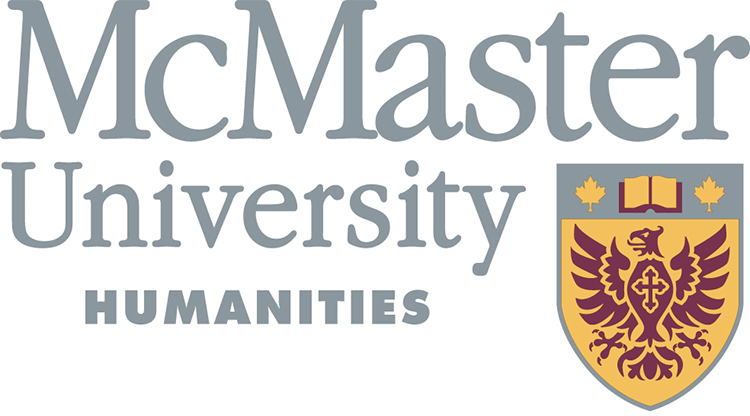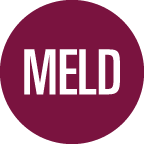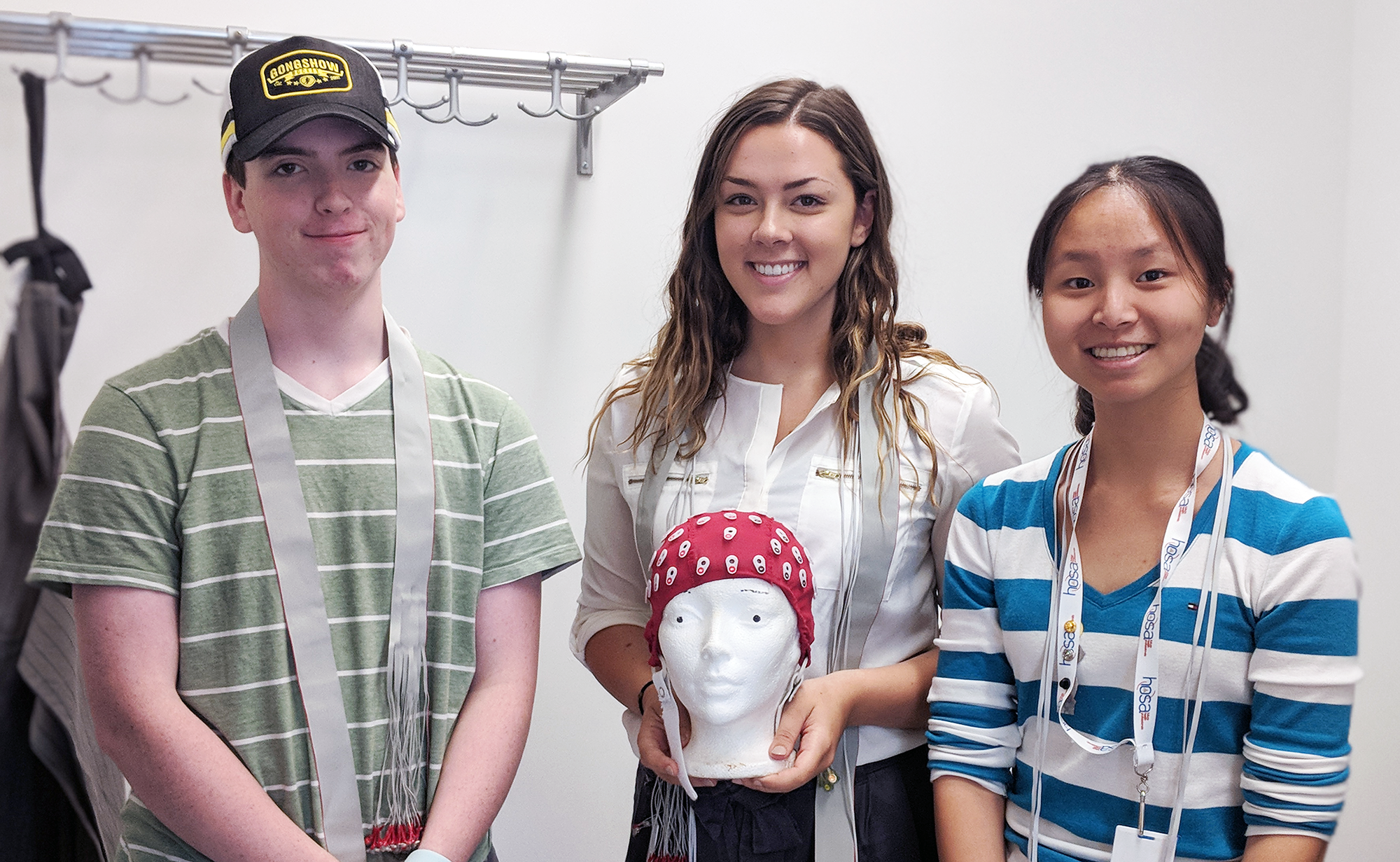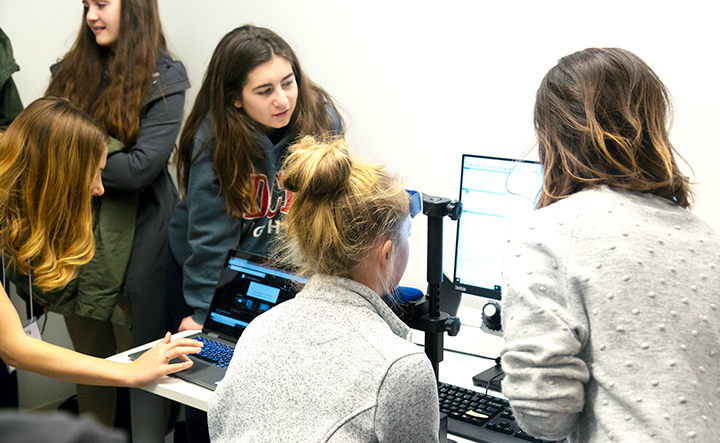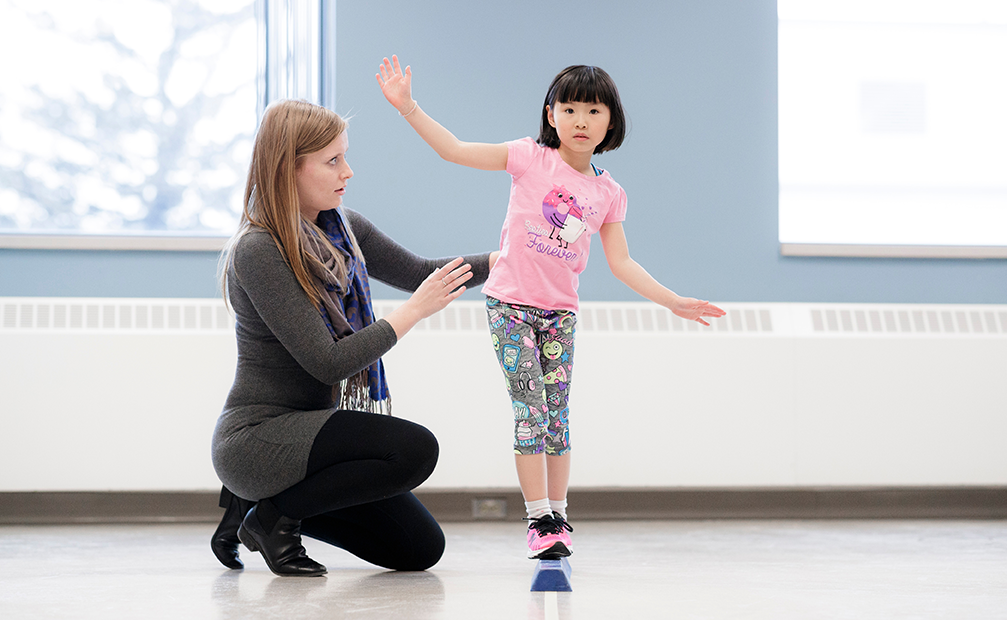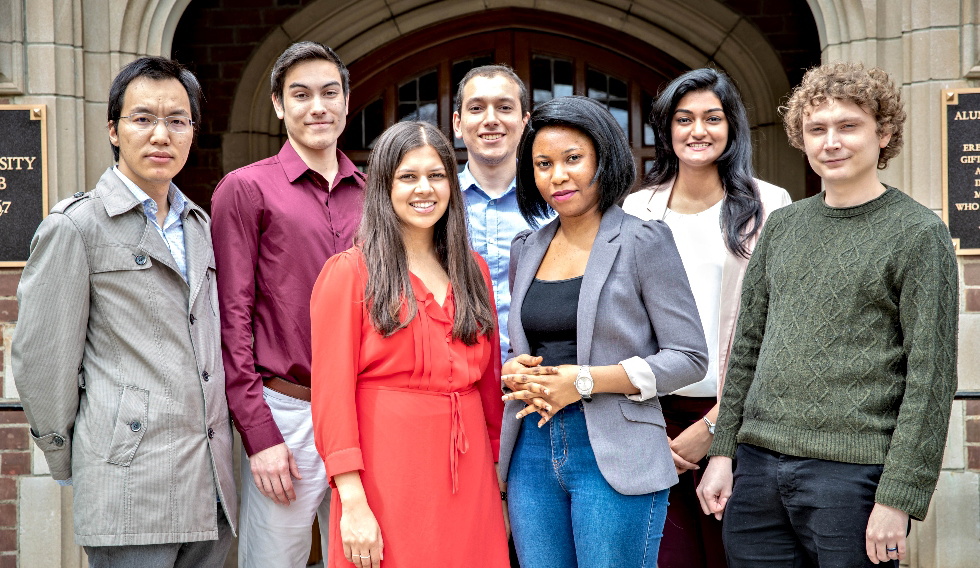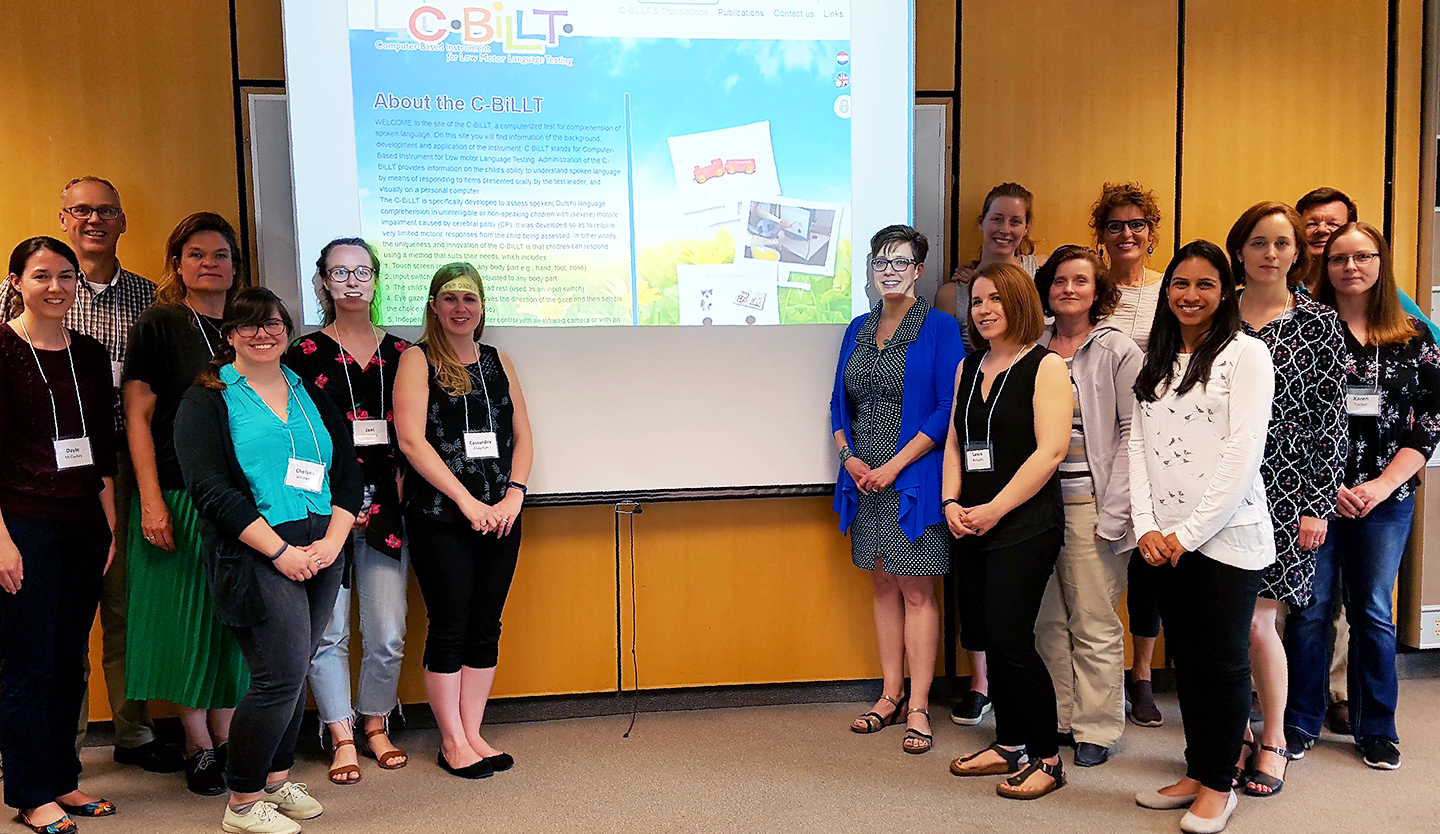ARiEAL
Annual Report 2018
Centre for Advanced Research in Experimental and Applied Linguistics
Message from the Director

In the second calendar year since the ARiEAL Research Centre was founded, 2018 has proven to be a busy and unequivocally productive year. It is with great pride that we offer an overview of what ARiEAL researchers and trainees have accomplished during the past year in this 2018 Annual Report.
All of us understand how challenging it is to secure research funding, especially in today’s economy. In only our second year of existence, ARiEAL Research Centre has flourished with existing collaborations and has also fostered new partnerships among our own researchers and national and international networks. Together, we started 15 new research grants as either Principal Investigators or Co-investigators in 2018 with funding totaling over 7.2 million dollars across these newly initiated projects (see GRANTS Section of this annual report).
We are also pleased to welcome Dr. Sue Becker to ARiEAL Research Centre as a Full Member in 2018. Dr. Becker directs the Neurotechnology and Neuroplasticity Lab at McMaster University which focuses on the neural bases of learning and memory. Dr. Becker’s knowledge and expertise in computational modelling, behavioural and neuroimaging studies further contributes to the breadth and interdisciplinarity of our membership.
Trainees play an essential role in ARiEAL, and their contributions make our collective success possible. It is one of our key objectives to provide opportunities for learning and mentorship across a variety of disciplines during their time at ARiEAL. In 2018, we are proud to announce the launch of the ARiEAL Travel Award Program to support our postgraduate trainees in presenting their research at various relevant peer-reviewed conferences, workshops and/or symposia. 2018 also marked the beginning of the ARiEAL Learning Series that aims to offer various opportunities for trainees (from undergraduate to postdoctoral fellows) to develop and refine their research skills, and to establish their research careers.
Even in this start-up phase, ARiEAL’s visibility is being established. In 2018 alone, our website (https://arieal.mcmaster.ca/) welcomed over 6,500 visitors from 97 countries. Our official Twitter account (@ARiEAL_Research) reached over 100,000 impressions with 165 tweets and exceeded 2,300 engagement counts. This 2018 annual report documents our interim productivity as we continue to strengthen the foundation of ARiEAL.
Sincerely,
Dr. John Connolly
Director, ARiEAL Research Centre
Professor, Department of Linguistics and Languages
Senator William McMaster Chair in the Cognitive Neuroscience of Language
Message from the Director

In the second calendar year since the ARiEAL Research Centre was founded, 2018 has proven to be a busy and unequivocally productive year. It is with great pride that we offer an overview of what ARiEAL researchers and trainees have accomplished during the past year in this 2018 Annual Report.
All of us understand how challenging it is to secure research funding, especially in today’s economy. In only our second year of existence, ARiEAL Research Centre has flourished with existing collaborations and has also fostered new partnerships among our own researchers and national and international networks. Together, we started 15 new research grants as either Principal Investigators or Co-investigators in 2018 with funding totaling over 7.2 million dollars across these newly initiated projects (see GRANTS Section of this annual report).
We are also pleased to welcome Dr. Sue Becker to ARiEAL Research Centre as a Full Member in 2018. Dr. Becker directs the Neurotechnology and Neuroplasticity Lab at McMaster University which focuses on the neural bases of learning and memory. Dr. Becker’s knowledge and expertise in computational modelling, behavioural and neuroimaging studies further contributes to the breadth and interdisciplinarity of our membership.
Trainees play an essential role in ARiEAL, and their contributions make our collective success possible. It is one of our key objectives to provide opportunities for learning and mentorship across a variety of disciplines during their time at ARiEAL. In 2018, we are proud to announce the launch of the ARiEAL Travel Award Program to support our postgraduate trainees in presenting their research at various relevant peer-reviewed conferences, workshops and/or symposia. 2018 also marked the beginning of the ARiEAL Learning Series that aims to offer various opportunities for trainees (from undergraduate to postdoctoral fellows) to develop and refine their research skills, and to establish their research careers.
Even in this start-up phase, ARiEAL’s visibility is being established. In 2018 alone, our website (https://arieal.mcmaster.ca/) welcomed over 6,500 visitors from 97 countries. Our official Twitter account (@ARiEAL_Research) reached over 100,000 impressions with 165 tweets and exceeded 2,300 engagement counts. This 2018 annual report documents our interim productivity as we continue to strengthen the foundation of ARiEAL.
Dr. John Connolly
Director, ARiEAL Research Centre
Professor, Department of Linguistics and Languages
Senator William McMaster Chair in the Cognitive Neuroscience of Language
Research Highlights
ARiEAL exemplifies interdisciplinary collaboration among its researchers who have expertise in linguistics and languages, relevant clinical conditions, and key neurophysiological, neuroimaging, and behavioural measures. Together, the research leads to an advanced understanding of the neural, behavioural and social foundations of human communication. Below are the highlighted 2018 research activities from each of the laboratories led by ARiEAL researchers.
- Language, Memory and Brain Lab
- MELD Programs
- Neurotechnology & Neuroplasticity Lab
- Teaching and Learning Lab
- Language, Reading & Cognitive Neuroscience Lab
- The Syntax Lab
- The Reading Lab
- Imaging Research Centre
- The Phonetics Lab
- The Reilly Lab
- The Turkstra Lab
- The Language and Working Memory Lab
- The MTBI Research Program
- The Performance Science Lab
Language, Memory and Brain Lab
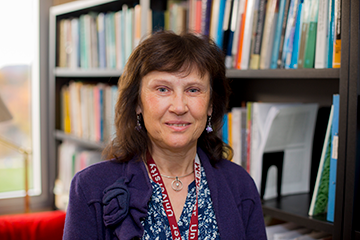
Co-director of the Language, Memory and Brain Lab, Dr. Elisabet Service
The Language, Memory and Brain (LMB) Lab, co-directed by Drs. John Connolly & Elisabet Service, conducts research using brain recording/imaging and behavioural measures to investigate a range of topics including basic research on language acquisition, spoken word processing, working memory, and other related cognitive processes. Much of this work is then applied in investigations of language challenges including dyslexia as well as studies of brain injury and disorders of consciousness. Dr. Connolly focuses primarily on the neuroscience of cognition with applications to assessment of clinical populations, while Dr. Service’s research focuses on cognitive aspects of processing, acquisition and impairments of language. In 2018, two students, San-Hei Kenny Luk (co-supervised by Dr. Elisabet Service and Dr. Daniel Pape) and Natalia Lapinskaya (supervised by Dr. John Connolly), successfully completed their master’s degree, and Richard Mah (supervised by Dr. John Connolly) completed his doctoral degree. Dr. Connolly’s coma project at the LMB lab continues and successfully received a Collaborative Health Research Projects grant from Canadian Institutes of Health Research and Natural Sciences and Engineering Research Council together with other ARiEAL members, Drs. Jim Reilly and Ranil Sonnadara, to develop a point of care system for automated coma prognosis. Publications on the disorders of consciousness that also involved other ARiEAL members appeared in IEEE Journal of Biomedical and Health Informatics and PLoS ONE. Dr. Service and her research partners in Finland published a study protocol on the Helsinki longitudinal specific language impairment project in BMC Psychology and she plans to adopt the cognitive part of the protocol in Canada in the coming year. Dr. Service’s study on the effects of second language use on performance of work-like tasks continues in 2018 and expansion of the study is being planned.
MELD Programs & The MELD Bilingualism Lab
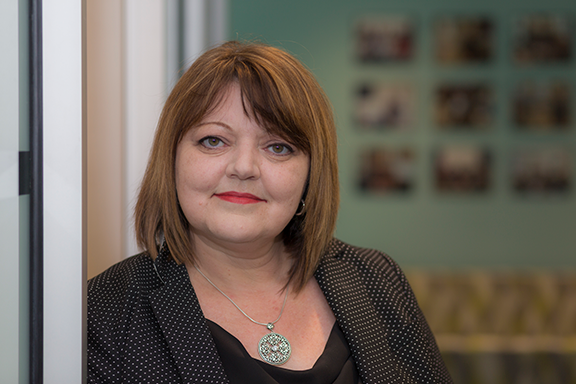
Associate Director of the ARiEAL Research Centre and Director of MELD programs and the Bilingualism Lab, Dr. Anna Moro
The McMaster English Language Development (MELD) Programs and the MELD Bilingualism Lab are both directed by Dr. Anna Moro. MELD programs are intended for international students whose primary language is not English, but wish to improve their English proficiency to succeed in an English-speaking higher education environment. Starting in 2018, MELD Programs have expanded the services from the MELD Diploma to also include McMaster English Readiness for Graduate Excellence (MERGE) and McMaster Office for the Development of English Language Learners (MODEL) to offer an even more comprehensive range of services to both undergraduate and graduate international students. The Bilingualism Lab investigates the underlying linguistic mechanisms of bilingual phenomena and focuses on second language acquisition. In 2018, the lab welcomes a new doctoral student, Rudaina Hamed (co-supervised by Drs. Anna Moro and Victor Kuperman). While MELD Programs are not a research laboratory per se, interesting research on foreign language acquisition is being conducted on a regular basis with the support and guidance of the Bilingualism Lab. In March and April 2018, the MELD research team continued the eye-tracking experiment and reading tests (including phonological processing, expressive and receptive vocabulary knowledge, and reading comprehension) with their 2017-2018 student cohort (who started in September 2017). The results were being compared to the data collected in the year prior to examine the changes in performance. Presentations based on the research findings were presented in the United States and Canada. The same testing procedure was implemented again with the 2018-2019 student cohort of 360. The continuity of these research activities aims to bring steady improvement to the MELD programs.
Neurotechnology & Neuroplasticity Lab
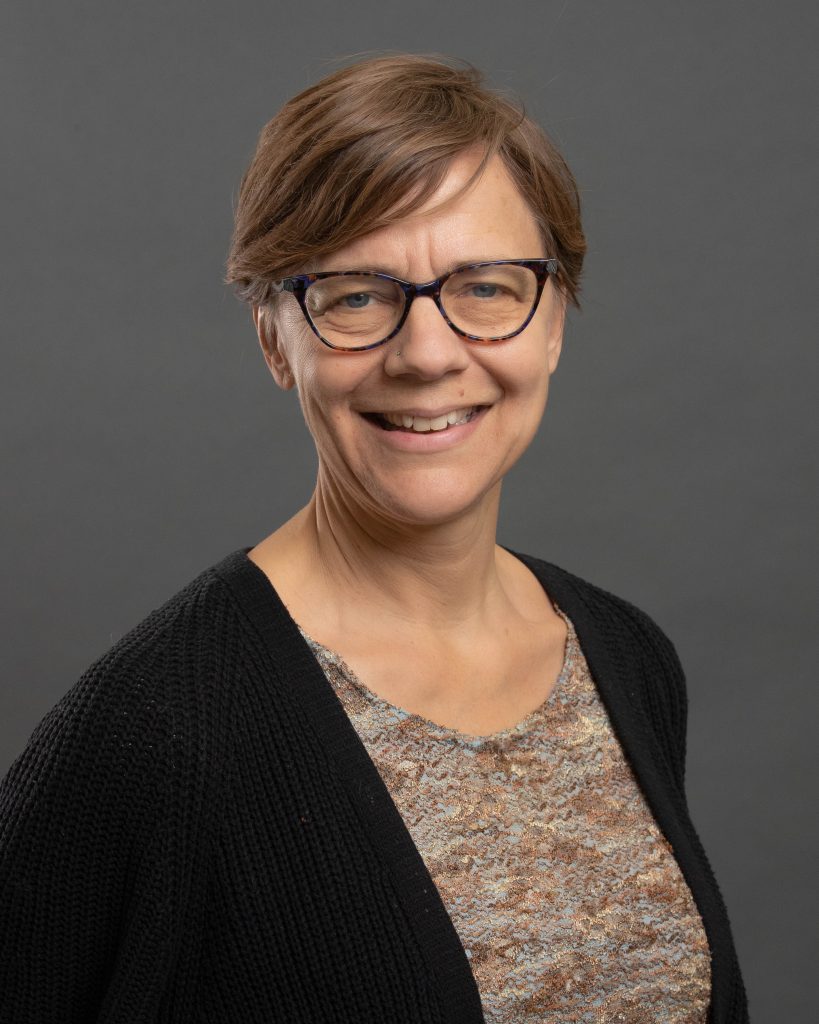
Director of the Neurotechnology and Neuroplasticity Lab, Dr. Sue Becker.
The Neurotechnology and Neuroplasticity Lab is directed by Dr. Sue Becker whose research focuses on the neural bases of learning and memory. The lab employs a variety of methodologies including computational modelling, behavioural and neuroimaging studies to investigate questions such as how the hippocampus codes episodic and spatial memories, the role of neurogenesis in memory and mood regulation, how stress, binge drinking, exercise and neurofeedback affect hippocampal memory functions and intrinsic brain networks, and how the auditory cortex re-organizes after hearing loss. Applications of this research include the development of novel algorithms for EEG-based neurofeedback and brain-computer-interfaces. In 2018, Lauren Smail and Sara Jamil from the lab successfully completed their master’s degree, and Craig Hutton as well as Laura Keating completed their doctoral degree. Dr. Becker also received infrastructure operating fund from the Canadian Foundation for Innovation for her research on hearing technology. Members of Dr. Becker’s lab disseminated their research findings at various local and national conferences including the 15th Conference on Computer and Robot Vision, and published their findings on automated neurofeedback training in IEEE Transactions on Neural Systems and Rehabilitation Engineering.
Teaching and Learning Lab
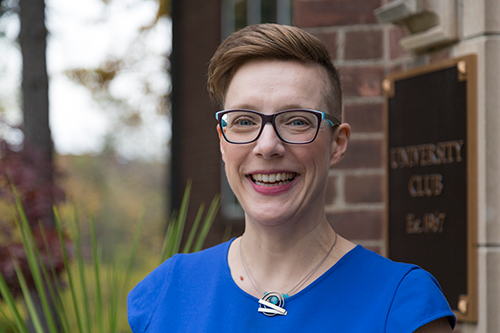 Director of the Teaching and Learning Lab, Dr. Catherine Anderson.
Director of the Teaching and Learning Lab, Dr. Catherine Anderson.
Dr. Catherine Anderson, an Associate Professor in the Department of Linguistics and Languages, directs the Teaching and Learning Lab. The lab’s research, all of which is conducted in collaboration with undergraduate student partners, focuses on students’ experiences in a variety of undergraduate learning contexts. In 2018, the undergraduate student partners continued their project: Dana Tucci completed another round of data collection for the Team-Based Learning in the Active Learning Classroom project; Paige McKenny and Dr. Anderson submitted a paper on working in partnership to conduct a program review to International Journal of Students as Partners. Also in 2018, with support from McMaster University and a $15,000 grant from eCampusOntario’s Open Textbook initiative, Dr. Anderson published an open-access Linguistics textbook entitled Essentials of Linguistics to address the affordability and accessibility of course materials. In the context of the calls to action in the Truth and Reconciliation Commission’s report in 2015, Dr. Anderson also included a chapter on how linguistics can help Indigenous communities preserve their languages in Canada.
Language, Reading and Cognitive Neuroscience Lab
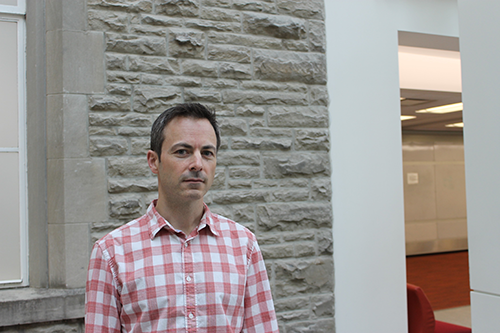
Director of the Language, Reading and Cognitive Neuroscience Lab, Dr. Marc Joanisse.
The Language, Reading and Cognitive Neuroscience Lab is directed by Dr. Marc Joanisse, and is housed in The University of Western Ontario’s Brain and Mind Institute. Dr. Joanisse’s Lab examines the cognitive and neural foundations of language and reading across the lifespan. This includes studying reading and language disorders in children, as well as language learning and processing in adults. A wide variety of experimental techniques including eye-tracking and event-related potentials measured with EEG are used, along with resting-state and task-based functional magnetic resonance imaging. In 2018, the Language, Reading and Cognitive Neuroscience lab received funding from Canada Foundation for Innovation for its infrastructure development. While the lab continued its multi-year project in examining the influence of reading remediation on brain markers of reading impairment in school-aged children, Dr. Marc Joanisse also received the Canada First Research Excellence Fund to study the neurocognitive, genetic and environmental risk factors of learning disorders in children. In addition to this, Dr. Joanisse’s continued collaboration with another ARiEAL member, Dr. Lisa Archibald, resulted in three journal article publications and two presentations in 2018.
The Syntax Lab
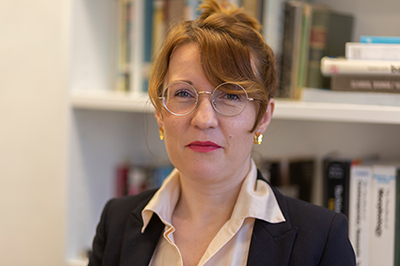
Director of the Syntax Lab, Dr. Ivona Kučerová.

Director of the Syntax Lab, Dr. Ivona Kučerová.
The Syntax Lab is directed by Dr. Ivona Kučerová and it investigates syntactic structures, including combinatorial properties of natural languages from the general-cognition perspective. Both traditional fieldwork and experimental methods are used to collect data from cross-linguistically diverse languages, including Indigenous languages of Canada, in order to identify and model universal and language-specific structural properties human languages have. The primary focus of the lab is on modelling features at the syntax-semantics interface. In 2018, Dr. Kučerová’s student, Cassandra Chapman, successfully completed her doctorate degree, and Dr. Nicholas Welch completed his postdoctoral fellowship. The groundwork started in 2017 on creating a formal research collaboration with the communities of the Six Nations of the Grand River led to a successful grant application. Dr. Kučerová received an Indigenous Research and Reconciliation Connection Grant from Social Sciences and Humanities Research Council to study the rigor of Indigenous pedagogy regarding language revitalization and the possible pathways for collaboration with university-based research. The lab continued its participation in several experimental projects on sentential processing with international partners in the United States of America, the United Arab Emirates, and the Czech Republic. Dr. Kučerová was invited to speak at various seminars and conferences across the world, including serving as the keynote speaker at the Stanford University Formal Approaches to Slavic Languages Conference.
The Reading Lab
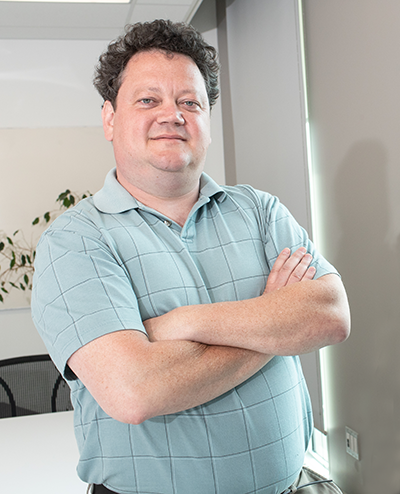
Director of the Reading Lab, Dr. Victor Kuperman.
The Reading Lab is directed by Dr. Victor Kuperman and it targets a range of areas in psycholinguistics and corpus linguistics. More specifically, the Reading Lab focuses on the visuo-oculomotor and cognitive predictors of reading, the processing of printed morphologically complex words, and the effects of emotion on language production and comprehension. Eye-tracking is the key research paradigm at the Reading Lab. In 2018, the Reading Lab welcomed one new master’s student, Sean McCarron. Members of the Reading Lab had a successful year presenting their work at various international conferences including the 11th International Conference on the Mental Lexicon, and the 59th Annual Meeting of the Psychonomic Society. Lab members also published their work in a number of prestigious journals including: Scientific Reports, Behavior Research Methods and PLoS ONE. In particular, the “Twitter” Study which examines differences in the language used in nearly 40-million tweets in the United States of America and Canada went viral and led to a range of media coverage. Through Dr. Kuperman’s collaboration with “Words in the World (WoW)”, a Social Sciences and Humanities Research Council Partnered Research Training Initiative, the Reading Lab continued to host many researchers from around the world to conduct workshops and/or present at the lecture series at ARiEAL.
Imaging Research Centre
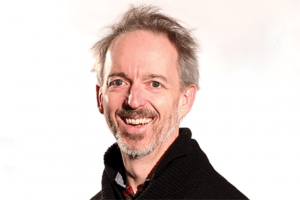
Director of the Imaging Research Centre, Dr. Michael Noseworthy.
Dr. Michael Noseworthy is the director of the Medical Imaging Physics and Engineering at the Imaging Research Centre at St. Joseph’s Healthcare Hamilton, which provides the research community with access to imaging technology (including the GE Healthcare 3T Discovery MR7503T MRI scanner, and a Siemens Biograph-16 PET/CT scanner). In 2018, two of Dr. Noseworthy’s students, Diana Harasym and Nicholas Simard (co-supervised by Drs. Michael Noseworthy & Aimee Nelson), successfully completed their master’s degree, and Alejandro Santos-Diaz and Evan McNabb completed their doctoral degree. Dr. Noseworthy’s team has built MRI hardware and written new pulse sequences for rapidly assessing the high energy phosphates and intra/extracellular sodium levels within the brain, as well as continuing to develop novel technology for non-proton based MRI scanning. Recently his group has been developing machine learning approaches to better understand medical images that depict brain diseases and various cancers. Dr. Noseworthy was invited by the Universidad Nacional Autónoma de México and Congreso Médica Campestre in Mexico on different occasions to present the clinical applications of advanced MRI methods. Members of his team also participated in a number of conferences during 2018 including one for the International Society for Magnetic Resonance in Medicine in France. Their work was also published in several highly regarded journals including Magnetic Resonance Imaging, as well as Physics in Medicine and Biology.
The Phonetics Lab
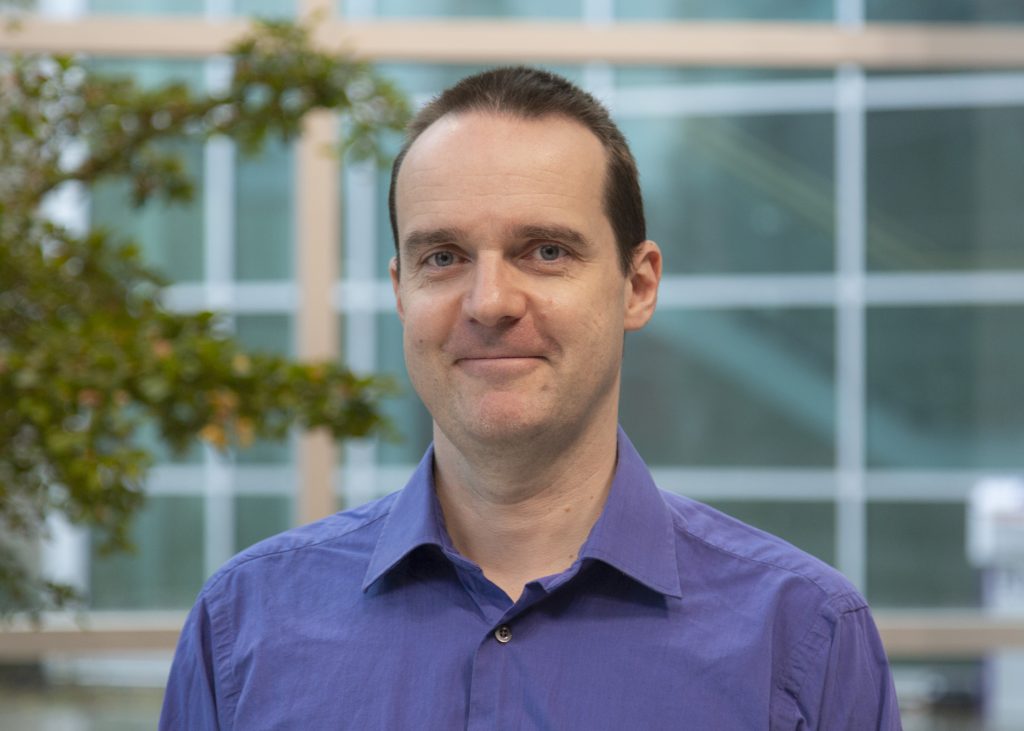
Director of the Phonetics Lab, Dr. Daniel Pape.
The Phonetics Lab is directed by Dr. Daniel Pape, and it focuses on experimental phonetics, the link between speech production and speech perception, and the relationship between phonetics and neurolinguistics. More specifically, the research at the Phonetics Lab examines the use and interplay of acoustic cues (i.e., cue-weighting) for (1) speech production and perception and (2) articulatory and biomechanical constraints in speech perception. 2018 marked many great milestones in the Phonetics Lab. Dr. Pape officially accepted a tenure-track position in the Department of Linguistics and Languages at McMaster University. As San-Hei Kenny Luk (co-supervised by Drs. Daniel Pape and Elisabet Service) successfully completed his master’s degree, the lab welcomed its first PhD student, Sara Pearsell, in 2018. Dr. Pape also received the Early Researcher Discovery Grant from Natural Sciences and Engineering Research Council to maintain and enhance the lab’s research facility to further investigate subphonemic cue-weighting and prosodic categories as they pertain to speech production and speech perception. The study on the articulatory settings and their relationship to the produced speech sounds for Polish retroflexes, and the study on the cue-weighting of Canadian English stops both started in 2017 and are steadily underway in 2018. A new experimental research stream examining the importance and interplay of several acoustic cues on the production and perception of lexical stress and focus started in 2018.
The Reilly Lab
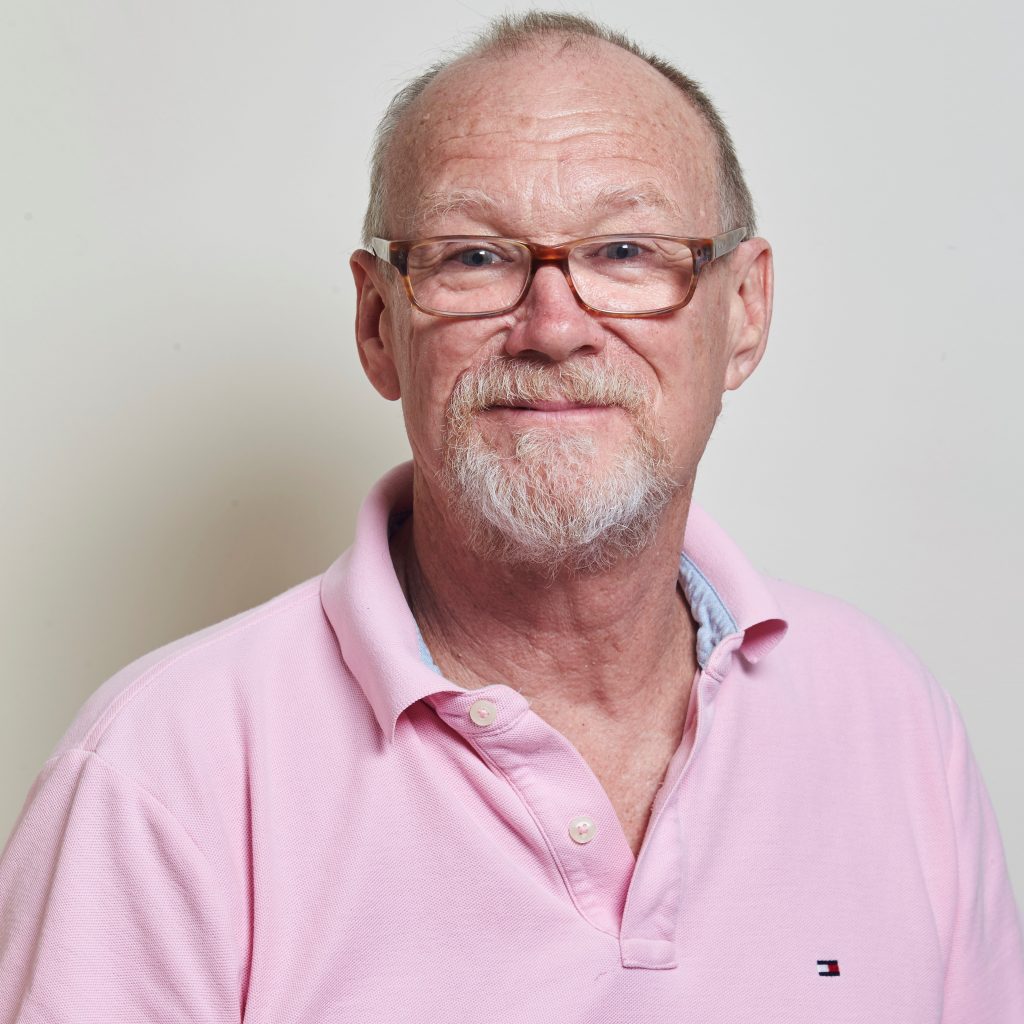
Director of the Reilly Lab, Dr. Jim Reilly.
The Turkstra Lab
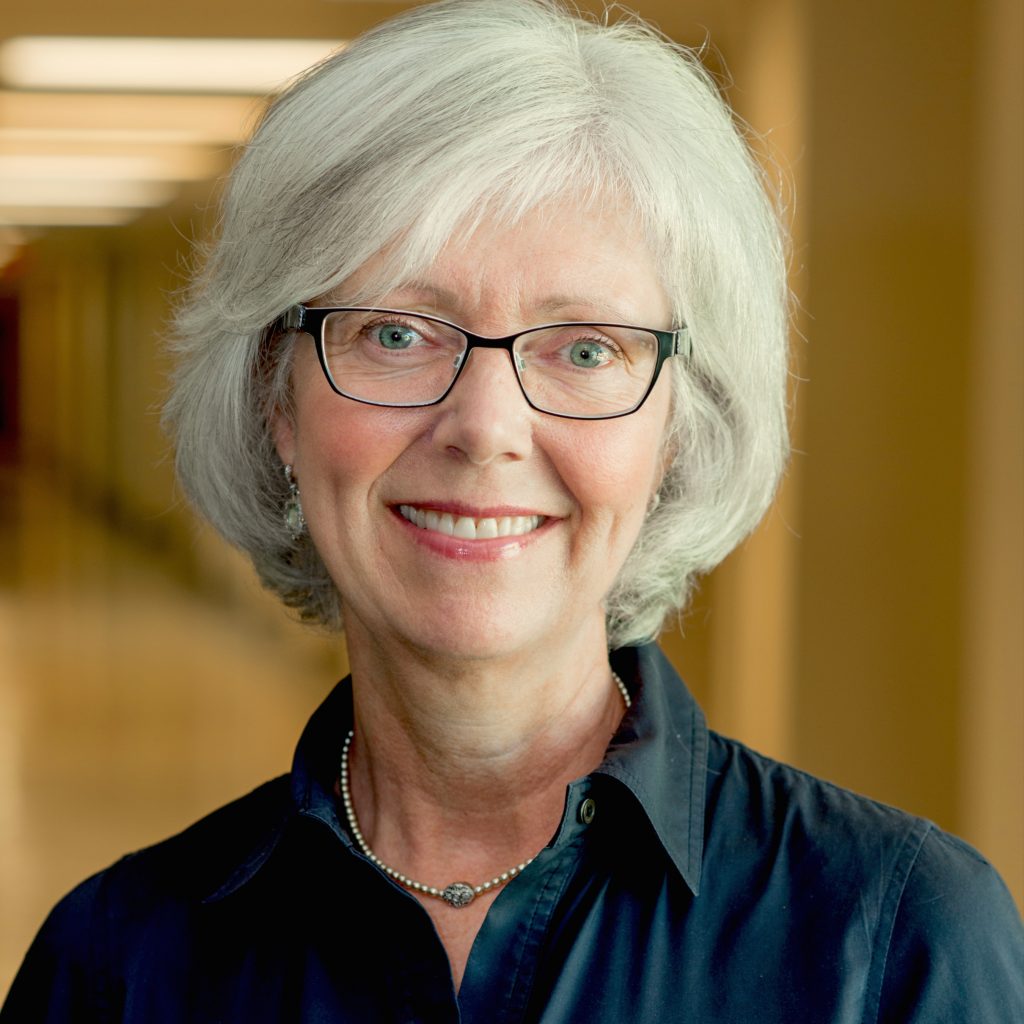
Director of the Turkstra Lab, Dr. Lyn Turkstra
Dr. Lyn Turkstra’s research examines links between cognitive function and social communication in individuals with traumatic brain injury (TBI), with the goal of improving clinical practice and long-term patient outcomes. The Turkstra lab had a productive 2018. In the spring, undergraduate students Noel Kim, Emily MacIntyre, and Jonathan Jin were awarded third place for their poster on everyday adolescent language, at the Hamilton Health Sciences 25th Annual Conference on Neurobehavioural Rehabilitation in Acquired Brain Injury. In the summer, the lab launched a collaborative study with Drs. Sheila Sprague and Mohit Bhandari in the McMaster Orthopaedic Surgery Department, to determine the prevalence of TBI and intimate partner violence among female patients. In the fall, the lab welcomed a new Neuroscience master’s student, Reihaneh Ahmadi. Dr. Turkstra and her colleagues also successfully received funding from the US Department of Defense to develop a brief cognitive rehabilitation intervention for Service Members and Veterans with mild TBI.
The Language and Working Memory Lab
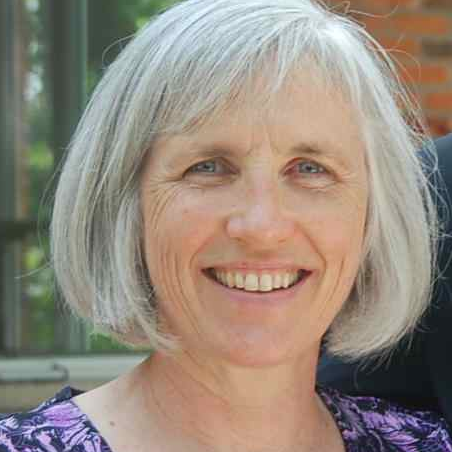
Director of the Language and Working Memory Lab, Dr. Lisa Archibald
The Language and Working Memory Lab is directed by Dr. Lisa Archibald, and is part of the School of Communication Sciences and Disorders at The University of Western Ontario. The Language and Working Memory Lab focuses on investigating how language and memory processes interact in both children learning at a typical rate and those with learning disabilities. In 2018, Dr. Archibald was successful in receiving a Social Sciences and Humanities Research Council (SSHRC) Partnership Development Grant to fund the development of a new research model targeting language and literacy learning in primary school children. Using a practice-based research approach, Dr. Archibald and her students have established partnerships with 3 area school boards to address questions arising from practice by educational speech-language pathologists promoting language and literacy. In addition to this, Dr. Archibald and her colleague received a SSHRC Insight Grant for their research regarding early interventions in writing. The initial study in this project has examined oral narrative language intervention for promoting written language outcomes in grade 1 students. A number of Dr. Archibald’s students successfully completed their degree during 2018 including Nicolette Noonan, Laura Pauls, Areej Balilah, and Renata Lohemann. Students working under the supervision of Dr. Archibald at the Language and Working Memory Lab also contributed to a number of articles published in well-regarded journals including the Canadian Journal of Speech-Language Pathology as well as Audiology and Language, Speech, and Hearing Services in Schools. Research conducted at the Language and Working Memory Lab was presented at various conferences including the Symposium on Research in Child Language Disorders. 2018 also saw the continued collaboration between Dr. Archibald and her fellow ARiEAL member, Dr. Marc Joanisse, which resulted in three journal article publications and two conference presentations.
The MTBI Research Program
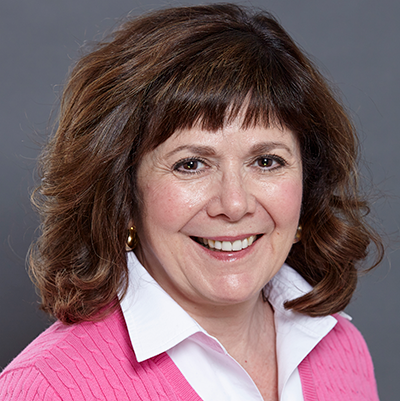
Director of The mTBI Research Program, Professor Carol DeMatteo.
As a clinician scientist, Professor Carol DeMatteo has led many research studies in the area of childhood neurotrauma, specifically all severities of acquired brain injury including concussion. Professor DeMatteo is based at CanChild Centre for Childhood Disability Research and the School of Rehabilitation Science, and in 2018, she continued collaboration with researchers across Canada to study the diagnosis and treatment of children presenting with concussions in pediatric emergency departments. Professor DeMatteo also co-authored several articles about this research, some of which are published in the Journal of Emergency Medicine and the Journal of Neurotrauma. During 2018, Professor DeMatteo and the team (including ARiEAL members, Drs. John Connolly and Michael Noseworthy, and ARiEAL manager, Ms. Chia-Yu Lin) were completing the data analyses for the Canadian Institutes of Health Research funded Back to Play study on evaluating the effectiveness of Return to Activity (RTA) and Return to School (RTS) Guidelines in the pediatric population. While manuscript preparation is still underway, Professor DeMatteo presented the interim results, both nationally and internationally, at the Third International Conference on Paediatric Acquired Brain Injury, as well as the Annual Meeting of Pediatric Academic Societies. She was also invited to share the Canadian lessons learned on managing pediatric concussion in Liverpool, UK. Professor DeMatteo with the Brain Smart Hamilton Team received funding from the Hamilton Community Foundation to attempt to learn about the current practices regarding concussion protocols in organized youth sports in Hamilton. Final analyses and dissemination are currently underway. Professor DeMatteo, alongside the Concussion Research Team with internal funding from CanChild, updated and revised the CanChild Pediatric RTA and RTS concussion management guidelines, in accordance to the 2017 Berlin Consensus Statement on Concussion, a recently completed systematic review on the effects of guidelines on RTA and RTS, and the results from the Back to Play study.
The Performance Science Lab
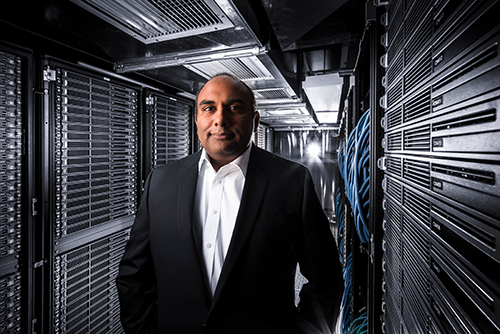
Director of the Performance Science Lab, Dr. Ranil Sonnadara.
The Performance Science Lab is directed by Dr. Ranil Sonnadara, and it studies the way that people learn new skills. The lab is particularly interested in how information flow across the motor and perceptual systems changes with practice, and how feedback and assessment can be effectively implemented to support skill acquisition. The lab also studies ways to optimize performance in high-stakes environments, and how performance can be measured in meaningful ways. In 2018, The Performance Science Lab continued to explore the role of competence committees in competency-based medical education, how we learn through observation, the transition from clerkship to residency, and how we can use machine learning as a teaching aide in healthcare. Research was presented at a number of distinguished conferences including the World Summit on Competency-Based Medical Education, the International Conference of Residency Education and the 15th Conference on Computer and Robot Vision. In 2018, Dr. Sonnadara and his team successfully received six research grants, published nine research articles/book chapters, and shared their work through 23 presentations across the globe. Several of Dr. Sonnadara’s students successfully completed their master’s degree in 2018 including: Lauren Smail, Sara Jamil, Dr. Laura Vanderbeek, and Dr. Christine Orr.
- Language, Memory and Brain Lab
- MELD Programs
- Neurotechnology & Neuroplasticity Lab
- Teaching and Learning Lab
- Language, Reading & Cognitive Neuroscience Lab
- The Syntax Lab
- The Reading Lab
- Imaging Research Centre
- The Phonetics Lab
- The Reilly Lab
- The Turkstra Lab
- The Language and Working Memory Lab
- The MTBI Research Program
- The Performance Science Lab
Language, Memory and Brain Lab
The Language, Memory and Brain (LMB) Lab, co-directed by Drs. John Connolly & Elisabet Service, conducts research using brain recording/imaging and behavioural measures to investigate a range of topics including basic research on language acquisition, spoken word processing, working memory, and other related cognitive processes. Much of this work is then applied in investigations of language challenges including dyslexia as well as studies of brain injury and disorders of consciousness. Dr. Connolly focuses primarily on the neuroscience of cognition with applications to assessment of clinical populations, while Dr. Service’s research focuses on cognitive aspects of processing, acquisition and impairments of language. In 2018, two students, San-Hei Kenny Luk (co-supervised by Dr. Elisabet Service and Dr. Daniel Pape) and Natalia Lapinskaya (supervised by Dr. John Connolly), successfully completed their master’s degree, and Richard Mah (supervised by Dr. John Connolly) completed his doctoral degree. Dr. Connolly’s Coma project at the LMB lab continues and successfully received a Collaborative Health Research Projects grant from Canadian Institutes of Health Research and Natural Sciences and Engineering Research Council together with other ARiEAL members, Drs. Jim Reilly and Ranil Sonnadara, to develop a point of care system for automated coma prognosis. Publications on the disorders of consciousness that also involved other ARiEAL members appeared in IEEE Journal of Biomedical and Health Informatics and PLoS ONE. Dr. Service and her research partners in Finland published a study protocol on the Helsinki longitudinal specific language impairment project in BMC Psychology and she plans to adopt the cognitive part of the protocol in Canada in the coming year. Dr. Service’s study on the effects of second language use on performance of work-like tasks continues in 2018 and expansion of the study is being planned.
MELD Programs & The MELD Bilingualism Lab
The McMaster English Language Development (MELD) Programs and the MELD Bilingualism Lab are both directed by Dr. Anna Moro. MELD programs are intended for international students whose primary language is not English, but wish to improve their English proficiency to succeed in an English-speaking higher education environment. Starting in 2018, MELD Programs have expanded the services from the MELD Diploma to also include McMaster English Readiness for Graduate Excellence (MERGE) and McMaster Office for the Development of English Language Learners (MODEL) to offer an even more comprehensive range of services to both undergraduate and graduate international students. The Bilingualism Lab investigates the underlying linguistic mechanisms of bilingual phenomena and focuses on second language acquisition. In 2018, the lab welcomes a new doctoral student, Rudaina Hamed (co-supervised by Drs. Anna Moro and Victor Kuperman). While MELD Programs are not a research laboratory per se, interesting research on foreign language acquisition is being conducted on a regular basis with the support and guidance of the Bilingualism Lab. In March and April 2018, the MELD research team continued the eye-tracking experiment and reading tests (including phonological processing, expressive and receptive vocabulary knowledge, and reading comprehension) with their 2017-2018 student cohort (who started in September 2017). The results were being compared to the data collected in the year prior to examine the changes in performance. Presentations based on the research findings were presented in the United States and Canada. The same testing procedure was implemented again with the 2018-2019 student cohort of 360. The continuity of these research activities aims to bring steady improvement to the MELD programs.
Neurotechnology & Neuroplasticity Lab
The Neurotechnology and Neuroplasticity Lab is directed by Dr. Sue Becker whose research focuses on the neural bases of learning and memory. The Neurotechnology and Neuroplasticity Lab employs a variety of methodologies including computational modelling, behavioural and neuroimaging studies to investigate questions such as how the hippocampus codes episodic and spatial memories, the role of neurogenesis in memory and mood regulation, how stress, binge drinking, exercise and neurofeedback affect hippocampal memory functions and intrinsic brain networks, and how the auditory cortex re-organizes after hearing loss. Applications of this research include the development of novel algorithms for EEG-based neurofeedback and brain-computer-interfaces. In 2018, two students from the Neurotechnology and Neuroplasticity Lab, Lauren Smail and Sara Jamil, successfully completed their master’s degree, and Craig Hutton as well as Laura Keating completed their doctoral degree. Dr. Becker also received infrastructure operating fund from the Canadian Foundation for Innovation for her research on hearing technology. Members of Dr. Becker’s lab disseminated their research findings at various local and national conferences including the 15th Conference on Computer and Robot Vision, and published their findings on automated neurofeedback training in IEEE Transactions on Neural Systems and Rehabilitation Engineering.
Teaching and Learning Lab
Dr. Catherine Anderson, an Associate Professor in the Department of Linguistics and Languages, directs the Teaching and Learning Lab. The lab’s research, all of which is conducted in collaboration with undergraduate student partners, focuses on students’ experiences in a variety of undergraduate learning contexts. In 2018, the undergraduate student partners continued their project: Dana Tucci completed another round of data collection for the Team-Based Learning in the Active Learning Classroom project; Paige McKenny and Dr. Anderson submitted a paper on working in partnership to conduct a program review to International Journal of Students as Partners. Also in 2018, with support from McMaster University and a $15,000 grant from eCampusOntario’s Open Textbook initiative, Dr. Anderson published an open-access Linguistics textbook entitled Essentials of Linguistics to address the affordability and accessibility of course materials. In the context of the calls to action in the Truth and Reconciliation Commission’s report in 2015, Dr. Anderson also included a chapter on how linguistics can help Indigenous communities preserve their languages in Canada.
Language, Reading and Cognitive Neuroscience Lab
The Language, Reading and Cognitive Neuroscience Lab is directed by Dr. Marc Joanisse, and is housed in The University of Western Ontario’s Brain and Mind Institute. Dr. Joanisse’s Lab examines the cognitive and neural foundations of language and reading across the lifespan. This includes studying reading and language disorders in children, as well as language learning and processing in adults. A wide variety of experimental techniques including eye-tracking and event-related potentials measured with EEG are used, along with resting-state and task-based functional magnetic resonance imaging. In 2018, the Language, Reading and Cognitive Neuroscience lab received funding from Canada Foundation for Innovation for its infrastructure development. While the lab continued its multi-year project in examining the influence of reading remediation on brain markers of reading impairment in school-aged children, Dr. Marc Joanisse also received the Canada First Research Excellence Fund to study the neurocognitive, genetic and environmental risk factors of learning disorders in children. In addition to this, Dr. Joanisse’s continued collaboration with another ARiEAL member, Dr. Lisa Archibald, resulted in three journal article publications and two presentations in 2018.
The Syntax Lab
The Syntax Lab is directed by Dr. Ivona Kučerová and it investigates syntactic structures, including combinatorial properties of natural languages from the general-cognition perspective. Both traditional fieldwork and experimental methods are used to collect data from cross-linguistically diverse languages, including Indigenous languages of Canada, in order to identify and model universal and language-specific structural properties human languages have. The primary focus of the work currently done in the lab is on modelling features at the syntax-semantics interface. In 2018, one of Dr. Kučerová’s students, Cassandra Chapman, successfully completed her doctorate degree, and Dr. Nicholas Welch also completed his postdoctoral fellowship. The groundwork started in 2017 on creating a formal research collaboration with the communities of the Six Nations of the Grand River led to a successful grant application. Dr. Kučerová received an Indigenous Research and Reconciliation Connection Grant from Social Sciences and Humanities Research Council to study the rigor of Indigenous pedagogy regarding language revitalization and the possible pathways for collaboration with university-based research. The lab continued its participation in several experimental projects on sentential processing with international partners in the United States of America, the United Arab Emirates, and the Czech Republic. Dr. Kučerová was invited to speak at various seminars and conferences across the world, including serving as the keynote speaker at the Stanford University Formal Approaches to Slavic Languages Conference.
The Reading Lab
The Reading Lab is directed by Dr. Victor Kuperman and it targets a range of areas in psycholinguistics and corpus linguistics. More specifically, the Reading Lab focuses on the visuo-oculomotor and cognitive predictors of reading, the processing of printed morphologically complex words, and the effects of emotion on language production and comprehension. Eye-tracking is the key research paradigm at the Reading Lab. In 2018, the Reading Lab welcomed one new master’s student, Sean McCarron. Members of the Reading Lab had a successful year presenting their work at various international conferences including the 11th International Conference on the Mental Lexicon, and the 59th Annual Meeting of the Psychonomic Society. Lab members also published their work in a number of prestigious journals including: Scientific Reports, Behavior Research Methods and PLoS ONE. In particular, the “Twitter” Study which examines differences in the language used in nearly 40-million tweets in the United States of America and Canada went viral and led to a range of media coverage. Through Dr. Kuperman’s collaboration with “Words in the World (WoW)”, a Social Sciences and Humanities Research Council Partnered Research Training Initiative, the Reading Lab continued to host many researchers from around the world to conduct workshops and/or present at the lecture series at ARiEAL.
Imaging Research Centre
Dr. Michael Noseworthy is the director of the Medical Imaging Physics and Engineering at the Imaging Research Centre at St. Joseph’s Healthcare Hamilton, which provides the research community with access to imaging technology (including the GE Healthcare 3T Discovery MR7503T MRI scanner, and a Siemens Biograph-16 PET/CT scanner). In 2018, two of Dr. Noseworthy’s students, Diana Harasym and Nicholas Simard (co-supervised by Drs. Michael Noseworthy & Aimee Nelson), successfully completed their master’s degree, and Alejandro Santos-Diaz and Evan McNabb completed their doctoral degree. Dr. Noseworthy’s team has built MRI hardware and written new pulse sequences for rapidly assessing the high energy phosphates and intra/extracellular sodium levels within the brain, as well as continuing to develop novel technology for non-proton based MRI scanning. Recently his group has been developing machine learning approaches to better understand medical images that depict brain diseases and various cancers. Dr. Noseworthy was invited by the Universidad Nacional Autónoma de México and Congreso Médica Campestre in Mexico on different occasions to present the clinical applications of advanced MRI methods. Members of his team also participated in a number of conferences during 2018 including one for the International Society for Magnetic Resonance in Medicine in France. Their work was also published in several highly regarded journals including Magnetic Resonance Imaging, as well as Physics in Medicine and Biology.
The Phonetics Lab
The Phonetics Lab is directed by Dr. Daniel Pape, and it focuses on experimental phonetics, the link between speech production and speech perception, and the relationship between phonetics and neurolinguistics. More specifically, the research at the Phonetics Lab examines the use and interplay of acoustic cues (i.e., cue-weighting) for (1) speech production and perception and (2) articulatory and biomechanical constraints in speech perception. 2018 marked many great milestones in the Phonetics Lab. Dr. Pape officially accepted a tenure-track position in the Department of Linguistics and Languages at McMaster University. As San-Hei Kenny Luk (co-supervised by Drs. Daniel Pape and Elisabet Service) successfully completed his master’s degree, the lab welcomed its first PhD student, Sara Pearsell, in 2018. Dr. Pape also received the Early Researcher Discovery Grant from Natural Sciences and Engineering Research Council to maintain and enhance the lab’s research facility to further investigate subphonemic cue-weighting and prosodic categories as they pertain to speech production and speech perception. The study on the articulatory settings and their relationship to the produced speech sounds for Polish retroflexes, and the study on the cue-weighting of Canadian English stops both started in 2017 and are steadily underway in 2018. A new experimental research stream examining the importance and interplay of several acoustic cues on the production and perception of lexical stress and focus started in 2018.
The Reilly Lab
Dr. Jim Reilly works at the interface of machine learning and signal processing applied to health-related problems, particularly in neuroscience and psychiatry. Specific projects in this area include the development of improved machine learning algorithms, diagnosis and treatment of psychiatric illness, prognosis for coma outcome, and the assessment of infant motor movement relating to neurological deficit. In 2018, one of the students (Phil Chrapka) from the Reilly Lab successfully completed their doctoral degree. The Reilly Lab also continues the collaboration with other ARiEAL members, including Dr. Connolly’s Language, Memory and Brain Lab, on the coma project. Together, they were awarded with a Collaborative Health Research Projects grant by Canadian Institutes of Health Research and Natural Sciences and Engineering Research Council to develop a point of care system for automated coma prognosis. Dr. Reilly takes the lead on advising the machine learning aspect of this funded project. Research conducted at the Reilly Lab were disseminated in manuscripts published in reputable journals including: IEEE Journal of Biomedical and Health Informatics and IEEE Transactions on Neural Networks and Learning Systems.
The Turkstra Lab
Dr. Lyn Turkstra’s research examines links between cognitive function and social communication in individuals with traumatic brain injury (TBI), with the goal of improving clinical practice and long-term patient outcomes. The Turkstra lab had a productive 2018. In the spring, undergraduate students Noel Kim, Emily MacIntyre, and Jonathan Jin were awarded third place for their poster on everyday adolescent language, at the Hamilton Health Sciences 25th Annual Conference on Neurobehavioural Rehabilitation in Acquired Brain Injury. In the summer, the lab launched a collaborative study with Drs. Sheila Sprague and Mohit Bhandari in the McMaster Orthopaedic Surgery Department, to determine the prevalence of TBI and intimate partner violence among female patients. In the fall, the lab welcomed a new Neuroscience master’s student, Reihaneh Ahmadi. Dr. Turkstra and her colleagues also successfully received funding from the US Department of Defense to develop a brief cognitive rehabilitation intervention for Service Members and Veterans with mild TBI.
The Language and Working Memory Lab
The Language and Working Memory Lab is directed by Dr. Lisa Archibald, and is part of the School of Communication Sciences and Disorders at The University of Western Ontario. The Language and Working Memory Lab focuses on investigating how language and memory processes interact in both children learning at a typical rate and those with learning disabilities. In 2018, Dr. Archibald was successful in receiving a Social Sciences and Humanities Research Council (SSHRC) Partnership Development Grant to fund the development of a new research model targeting language and literacy learning in primary school children. Using a practice-based research approach, Dr. Archibald and her students have established partnerships with 3 area school boards to address questions arising from practice by educational speech-language pathologists promoting language and literacy. In addition to this, Dr. Archibald and her colleague received a SSHRC Insight Grant for their research regarding early interventions in writing. The initial study in this project has examined oral narrative language intervention for promoting written language outcomes in grade 1 students. A number of Dr. Archibald’s students successfully completed their degree during 2018 including Nicolette Noonan, Laura Pauls, Areej Balilah, and Renata Lohemann. Students working under the supervision of Dr. Archibald at the Language and Working Memory Lab also contributed to a number of articles published in well-regarded journals including the Canadian Journal of Speech-Language Pathology as well as Audiology and Language, Speech, and Hearing Services in Schools. Research conducted at the Language and Working Memory Lab was presented at various conferences including the Symposium on Research in Child Language Disorders. 2018 also saw the continued collaboration between Dr. Archibald and her fellow ARiEAL member, Dr. Marc Joanisse, which resulted in three journal article publications and two conference presentations.
The MTBI Research Program
As a clinician scientist, Professor Carol DeMatteo has led many research studies in the area of childhood neurotrauma, specifically all severities of acquired brain injury including concussion. Professor DeMatteo is based at CanChild Centre for Childhood Disability Research and the School of Rehabilitation Science, and in 2018, she continued collaboration with researchers across Canada to study the diagnosis and treatment of children presenting with concussions in pediatric emergency departments. Professor DeMatteo also co-authored several articles about this research, some of which are published in the Journal of Emergency Medicine and the Journal of Neurotrauma. During 2018, Professor DeMatteo and the team (including ARiEAL members, Drs. John Connolly and Michael Noseworthy, and ARiEAL manager, Ms. Chia-Yu Lin) were completing the data analyses for the Canadian Institutes of Health Research funded Back to Play study on evaluating the effectiveness of Return to Activity (RTA) and Return to School (RTS) Guidelines in the pediatric population. While manuscript preparation is still underway, Professor DeMatteo presented the interim results, both nationally and internationally, at the Third International Conference on Paediatric Acquired Brain Injury, as well as the Annual Meeting of Pediatric Academic Societies. She was also invited to share the Canadian lessons learned on managing pediatric concussion in Liverpool, UK. Professor DeMatteo with the Brain Smart Hamilton Team received funding from the Hamilton Community Foundation to attempt to learn about the current practices regarding concussion protocols in organized youth sports in Hamilton. Final analyses and dissemination are currently underway. Professor DeMatteo, alongside the Concussion Research Team with internal funding from CanChild, updated and revised the CanChild Pediatric RTA and RTS concussion management guidelines, in accordance to the 2017 Berlin Consensus Statement on Concussion, a recently completed systematic review on the effects of guidelines on RTA and RTS, and the results from the Back to Play study.
The Performance Science Lab
The Performance Science Lab is directed by Dr. Ranil Sonnadara, and it studies the way that people learn new skills. The lab is particularly interested in how information flow across the motor and perceptual systems changes with practice, and how feedback and assessment can be effectively implemented to support skill acquisition. The lab also studies ways to optimize performance in high-stakes environments, and how performance can be measured in meaningful ways. In 2018, The Performance Science Lab continued to explore the role of competence committees in competency-based medical education, how we learn through observation, the transition from clerkship to residency, and how we can use machine learning as a teaching aide in healthcare. Research was presented at a number of distinguished conferences including the World Summit on Competency-Based Medical Education, the International Conference of Residency Education and the 15th Conference on Computer and Robot Vision. In 2018, Dr. Sonnadara and his team successfully received six research grants, published nine research articles/book chapters, and shared their work through 23 presentations across the globe. Several of Dr. Sonnadara’s students successfully completed their master’s degree in 2018 including: Lauren Smail, Sara Jamil, Dr. Laura Vanderbeek, and Dr. Christine Orr.
By the Numbers
ARiEAL Researchers have been active in dissemination through publishing articles and delivering presentations, and were also incredibly successful in securing research funding during 2018.
Publications
Presentations
Grants
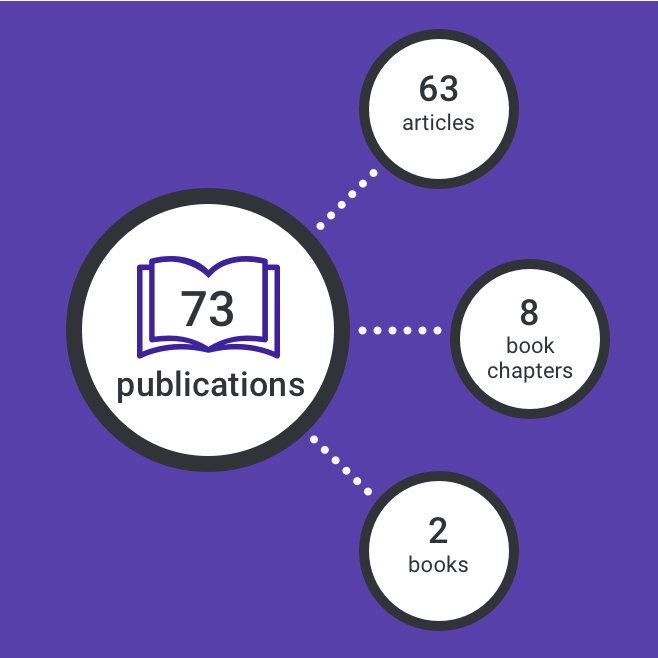 ARiEAL researchers published 63 articles, 8 book chapters, and 2 books during 2018. Broadly, the research topics included neuroimaging, word recognition, and applications in acquired brain injury and speech language pathology.
ARiEAL researchers published 63 articles, 8 book chapters, and 2 books during 2018. Broadly, the research topics included neuroimaging, word recognition, and applications in acquired brain injury and speech language pathology.
Featured below are a selection of these articles:
Armanfard, N., Komeili, M., Reilly, J.P., & Connolly, J.F. (2018). A machine learning framework for automatic and continuous MMN detection with preliminary results for coma outcome prediction. IEEE Journal of Biomedical and Health Informatics, 1-11.
Kwok, E.Y.L., Joanisse, M.F., Archibald, L.M.D., & Oram Cardy, J. (2018). Immature auditory evoked potentials in children with moderate-severe developmental language disorder. Journal of Speech, Language, and Hearing Research, 61(7): 1718-1730.
Snefjella, B., Schmidtke, D., & Kuperman, V. (2018). National character stereotypes mirror language use: A study of Canadian and American Tweets. PLoS ONE, 13(11): e0206188.
View full list of 2018 articles Acai, A., Steyn, C., Reid, S.E., & Sonnadara, R.R. (2018). The solution to gender inequity in surgery? Better caregiving policies. Canadian Journal of Surgery, 61(1): 6-7. Archibald, L.M.D. (2018). The reciprocal influences of working memory and linguistic knowledge on language performance: Considerations for the assessment of children with developmental language disorder. Language, Speech, and Hearing Services in Schools, 49(3): 424-433. Armanfard, N., Komeili, M., Reilly, J.P., & Connolly, J.F. (2018). A machine learning framework for automatic and continuous MMN detection with preliminary results for coma outcome prediction. IEEE Journal of Biomedical and Health Informatics, 1-11. Armanfard, N., Reilly, J.P., & Komeili, M. (2018). Logistic localized modeling of the sample space for feature selection and classification. IEEE Transactions on Neural Networks and Learning Systems, 29(5): 1396-1413. Balilah, A.M.A., & Archibald, L.M.D. (2018). Sentence recall and single word reading in monolingual children and same-age English language learners with and without parental concerns about language development. Canadian Journal of Speech-Language Pathology and Audiology, 42(2): 81-93. Boutis, K., Gravel, J., Freedman, S., Craig, W., Tang, K., DeMatteo, C., . . . Zemek, R. (2018). The physician diagnosis of concussion in pediatric emergency departments: A prospective multicenter study. The Journal of Emergency Medicine, 54(6): 757-765. Britten, J., Guan, W., & Sonnadara, R.R. (2018). Visualization of 3D diffraction: MAX3D update. Acta Crystallographica Foundations and Advances, A74, a399. Byom, L., Duff, J., Mutlu, B., & Turkstra, L.S. (2018). Facial emotion recognition of older adults with traumatic brain injury. Brain Injury, 33(3): 322-332. Cross, A.M., & Joanisse, M.F. (2018). Eyetracking of coarticulatory cue responses in children and adults. Language, Cognition and Neuroscience, 33(10): 1315-1324. Cross, A.M., Archibald, L.M.D., & Joanisse, M.F. (2018). Mathematical abilities in children with developmental language disorder. Language, Speech, and Hearing Services in Schools, 50(1): 150-163. Dhindsa, K., Gauder, K.D., Marszalek, K.A., Terpou, B., & Becker, S. (2018). Progressive thresholding: Shaping and specificity in automated neurofeedback training. IEEE Transactions on Neural Systems and Rehabilitation Engineering, 26(12): 2297-2305. Dresang, H., & Turkstra, L.S. (2018). Implicit causality bias in adults with traumatic brain injury. Journal of Communication Disorders, 71: 1-10. Fahim, C., Wagner, N., Nousiainen, M.T., & Sonnadara, R.R. (2018). Assessment of technical skills competence in the operating room: A systematic and scoping review. Academic Medicine, 93(5): 794-808. Flynn, M.A., Mutlu, B., Duff, M.C., & Turkstra, L.S. (2018). Friendship quality, friendship quantity, and social participation in adults with traumatic brain injury. Seminars in Speech and Language, 39(5): 416-425. Gagnon, I., Friedman, D., Beauchamp, M., Christie, B., DeMatteo, C., Macartney, G., . . . Mrazik, M. (2018). The Canadian Pediatric Mild Traumatic Brain Injury Common Data Elements Project: Harmonizing outcomes to increase understanding of pediatric concussion. Journal of Neurotrauma, 35(16): 1849-1857. Gauvin-Lepage, J., Friedman, D., Grilli, L., Sufrategui, M., DeMatteo, C., Iverson, G.L., & Gagnon, I. (2018). Effectiveness of an exercise-based active rehabilitation intervention for youth who are slow to recover after concussion. Clinical Journal of Sports Medicine, 1-10. Henry, R., Van Dyke, J. A., & Kuperman, V. (2018). Oculomotor Planning in RAN and Reading: A Strong Test of the Visual Scanning Hypothesis. Reading and Writing, 31(7): 1619–1643. Hicks, E.A., Zaveri, M., Deschamps, P., Noseworthy, M.D., Ball, A., Williams, T., & West-Mays, J. (2018). Conditional deletion of AP-2α and AP-2β in the developing murine retina leads to altered amacrine cell mosaics and disrupted visual function. Investigative Ophthalmology & Visual Science, 59(6): 2229-2239. Ho, R., Hall, G.B., Noseworthy, M.D., & DeMatteo, C. (2018). An Emotional Go/No-Go fMRI study in adolescents with depressive symptoms following concussion. International Journal of Psychophysiology, 132: 62-73. Hutton, C., Lemon, J., Sakic, B., Rollo, C., Boreham, D., Fahnestock, M., . . . Becker, S. (2018). Early intervention with a multi-ingredient dietary supplement improves mood and spatial memory in a triple transgenic mouse model of Alzheimer’s disease. Journal of Alzheimer’s Disease, 64(3): 835-857. Imbault, C., & Kuperman, V. (2018). Emotional reactivity and perspective-taking in individuals with and without severe depressive symptoms. Scientific Reports, 8: 1-8. Imbault, C., Shore, D., & Kuperman, V. (2018). Reliability of the sliding scale for collecting affective responses to words. Behavior Research Methods, 50(6), 2399-2407. Kalun, P., Wagner, N., Yan, J., Nousiainen, M.T., & Sonnadara, R.R. (2018). Surgical simulation training in orthopedics: Current insights. Advances in Medical Education and Practice, 9: 125-131. Keating, L.E., Becker, S., McCabe, K., Whattam, J., Garrick, L., Sassi, R.B., . . . McKinnon, M.C. (2018). Effects of a 12-week running programme in youth and adults with complex mood disorders. BMJ Open Sport and Exercise Medicine, 4(1): 1-7. Kučerová, I. (2018). ɸ-Features at the syntax-semantics interface: Evidence from nominal inflection. Linguistic Inquiry, 49(4): 813-845. Kumbhare, D.A., Ahmed, S., Behr, M., & Noseworthy, M.D. (2018). Quantitative ultrasound using texture analysis of myofascial pain syndrome in the trapezius. Critical Reviews in Biomedical Engineering, 46(1): 1-31. Kumbhare, D.K., Shaw, S., Ahmad, S., & Noseworthy, M.D. (2018). Quantitative ultrasound of trapezius muscle involvement in myofascial pain: Comparison of clinical and healthy population using texture analysis. Journal of Ultrasound, 61: 1-8. Kuntz, A.B., Chopp-Hurley, J.N., Brenneman, E.C., Karampatos, S., Wiebenga, E.G., Noseworthy, M.D., . . . Maly, M.R. (2018). Efficacy of a biomechanically-based yoga exercise program in knee osteoarthritis: A randomized controlled trial. PLOS One, 13(4): 1-18. Kuperman, V., Matsuki, K., & Van Dyke, J.A. (2018). Contributions of reader and text-level characteristics to eye-movement patterns during passage reading. Journal of Experimental Psychology: Learning, Memory, and Cognition, 44(11): 1687-1713. Kusec, A., DeMatteo, C., Velikonja, D., & Harris, J.E. (2018). Psychometric properties of measures of motivation and engagement after acquired brain injury. Rehabilitation Psychology, 63(1): 92-103. Kusec, A., Velikonia, D., DeMatteo, C., & Harris, J.E. (2018). Motivation in rehabilitation and acquired brain injury: Can theory help us understand it? Disability and Rehabilitation, 1-7. Kwok, E.Y.L., Joanisse, M.F., Archibald, L.M.D., & Oram Cardy, J. (2018). Immature auditory evoked potentials in children with moderate-severe developmental language disorder. Journal of Speech, Language, and Hearing Research, 61(7): 1718-1730. Kwok, E.Y.L., Joanisse, M.F., Archibald, L.M.D., Stothers, M.E., Brown, H.M., & Oram Cardy, J. (2018). Maturation in auditory event‐related potentials explains variation in language ability in children. European Journal of Neuroscience, 47(1): 69-76. Laasonen, M., Smolander, S., Lahti-Nuuttila, P., Leminen, M., Lajunen, H-R, Service, E., . . . Arkkila, E. (2018). Understanding developmental language disorder – the Helsinki Longitudinal SLI Study (HelSLI): A study protocol. BMC Psychology, 6(24): 1-13. Lord, M., McNeill, F., Gräfe, J., Noseworthy, M.D., & Chettle, D. (2018). Self-identified gadolinium toxicity: Comparison of gadolinium in bone and urine to healthy GBCA-exposed volunteers. Physiological Measurement, 39(11): 1-10. Mah, R., & Connolly, J.F. (2018). A framework for the extended monitoring of levels of cognitive function in unresponsive patients. PLoS ONE, 13(7): 1-33. Marshall, C. M., Chan, N., Tran, P. & DeMatteo, C. (2018, epub ahead of print). The use of an intensive physical exertion test as a final return to play measure in concussed athletes: A prospective cohort. The Physician and Sports Medicine. McKinnon, V.E., Kalun, P., McRae, M.H., Sonnadara, R.R., & Fahim, C. (2018). A shift on the horizon: A systematic review of assessment tools for plastic surgery trainees. Plastic and Reconstructive Surgery, 142(2): 217-231. McNabb, E., Wong, R., & Noseworthy, M.D. (2018). Localizing implanted fiducial markers using undersampled co-RASOR MR imaging. Magnetic Resonance Imaging, 48: 1-9. McNabb, E., Wong, R., & Noseworthy, M.D. (2018). Resolution and registration in dual-plane co-RASOR MR. Physics in Medicine and Biology, 63(21): 1-13. Meulenbroek, P.A., & Turkstra, L.S. (2018). Response to text-based social cues in the formation of causal attributions in adults with traumatic brain injury. Brain Injury, 32(13-14): 1720-1724. Mohamed Ali, O., Vandermeer, M.R., Sheikh, H.I., Joanisse, M.F., & Hayden, E.P. (2018). Girls’ internalizing symptoms and white matter tracts in cortico-limbic circuitry. NeuroImage: Clinical, 1-10. Mueller, K.D., Hermann, B., Mecollari, J., & Turkstra, L.S. (2018). Connected speech and language in mild cognitive impairment and Alzheimer’s disease: A review of picture description tasks. Journal of Clinical and Experimental Neuropsychology, 40(9): 917-939. Mueller, K.D., Koscik, R.L., Hermann, B.P., Johnson, S.C., & Turkstra, L.S. (2018). Declines in connected language are associated with very early mild cognitive impairment: Results from the Wisconsin Registry for Alzheimer’s Prevention. Frontiers in Aging Neuroscience, 9: 1-14. Ong, F.J., Ahmed, B.A., Oreskovich, S.M., Blondin, D.P., Haq, T., Noseworthy, M.D., . . . Morrison, K. (2018). Recent advances in the detection of brown adipose tissue in adult humans: A review. Clinical Science, 132(10): 1039-1054. Rabi, R., Joanisse, M.F., Zhu, T., & Minda, J.P. (2018). Cognitive changes in conjunctive rule-based category learning: An ERP approach. Cognitive, Affective, & Behavioral Neuroscience, 18(5): 1034-1048. Riedeman, S.K., & Turkstra, L.S. (2018). Knowledge, confidence, and practice patterns of speech-language pathologists working with adults with traumatic brain injury. American Journal of Speech-Language Pathology, 27(1): 181-191. Rigon, A., Voss, M., Turkstra, L.S., Mutlu, B., & Duff, M. (2018). White matter correlates of different aspects of facial affect recognition impairment following traumatic brain injury. Social Neuroscience, 1-15. Santos-Díaz, A., Obruchkov, S.I., Schulte, R.F., & Noseworthy, M.D. (2018). Phosphorus magnetic resonance spectroscopic imaging using flyback echo planar readout trajectories. Magnetic Resonance Materials in Physics, Biology and Medicine, 31(4): 553-564. Schmidtke, D., Gagne, C., Kuperman, V., & Spalding, T. (2018). Language experience shapes relational knowledge of compound words. Psychonomic Bulletin and Review. 25(4): 1468-1487. Schmidtke, D., Gagne, C., Kuperman, V., Spalding, T., & Tucker, B. (2018). Conceptual relations compete during auditory and visual compound word recognition. Language, Cognition, and Neuroscience, 33(7): 923-942. Schmidtke, D., Van Dyke, J.A., & Kuperman, V. (2018). Individual variability in the semantic processing of English compound words. Journal of Experimental Psychology: Learning, Memory and Cognition, 44(3): 421-439. Snefjella, B., Schmidtke, D., & Kuperman, V. (2018). National character stereotypes mirror language use: A study of Canadian and American Tweets. PLoS ONE, 13(11): e0206188. Søndergaard Knudsen, H.B., Jensen de López, K., & Archibald, L.M.D. (2018). The contribution of cognitive flexibility to children’s reading comprehension – the case for Danish. Journal of Research in Reading, 41(1): 130-148. Thompson, E., Beauchamp, M., Hearps, S.J., Hearps, S.J.C., Brown, A., Charalambous, G., . . . Turkstra, L.S. (2018). Protocol for a prospective school-based standardization study of a digital social skills assessment tool for children: The Paediatric Evaluation of Emotions, Relationships, and Socialisation (PEERS) study. BMJ Open, 8(2): 1-11. Turkstra, L.S., Norman, R.S., Mutlu, B., & Duff, M.C. (2018). Impaired theory of mind in adults with traumatic brain injury: A replication and extension of findings. Neuropsychologia, 111, 117-122. Wang, J., Joanisse, M.F., & Booth, J. (2018). Reading skill related to left ventral occipitotemporal cortex during a phonological awareness task in 5-6-year old children. Developmental Cognitive Neuroscience, 30: 116-122. Welcome, S.E., & Joanisse, M.F. (2018). ERPs reveal weaker effects of spelling on auditory rhyme decisions in children than in adults. Developmental Psychobiology, 60(1): 57-66. Whitford, V., & Joanisse, M.F. (2018). Do eye movements reveal differences between monolingual and bilingual children’s first- and second-language reading? A focus on word frequency effects. Journal of Experimental Child Psychology, 173: 318-337. Wszalek, J.A., & Turkstra, L.S. (2018). Comprehension of legal language by adults with and without traumatic brain injury. Journal of Head Trauma Rehabilitation, 1-9. Yeates, K., Tang, K., Barrowman, N., Freedman, S. B., Gravel, J., Gagnon, I., Sangha, G., Boutis, K., Beer, D., Craig, W., Burns, E., Farion, K. J., Mikrogianakis, A., Barlow, K., Dubrovsky, A. S., Meeuqisse, W., Gioia, G., Meehan, W. P., Beauchamp, M., Kamil, Y., Grool, A., Hoshizaki, B., Andrson, P., Brooks, B. L., Vassilyadi, M., Klassen, T., Keightley, M., Richer, L., DeMatteo, C., Osmon, M., & Zemek, R., for the Pediatric Emergency Research Canada (PERC) Predicting Persistent Post concussive Problems in Pediatrics (5P) Concussion Team. (2018, epub ahead of print). Derivation and initial validation of clinical phenotypes of children presenting with concussion acutely in the Emergency Department: Latent class analysis of a prospective cohort, multicentre, observational study. Journal of Neurotrauma. Zhu, H., Wagner, N., & Sonnadara, R.R. (2018). Developing effective recruitment strategies for young infants. Meducator, 1(34): 13-16.
View full list of 2018 book chapters Balilah, A., & Archibald, L.M.D. (2018). The measurement of language ability and impairment in Arabic-speaking children. In S. Hidri (Ed.), Revisiting the assessment of second language abilities: From theory to practice (pp. 65-84). Heidelberg, Germany: Springer International. Cao, B., & Reilly, J.P. (2018). Major challenges and limitations of big data analytics. In I. Cavalcante Passos, B. Mwangi, & F. Kapczinski (Eds.), Personalized psychiatry (pp. 15-36). Basel, Switzerland: Springer Nature. Ciucci, M., Montgomery, E.B. Jr., & Turkstra, L.S. (2018). Neurophysiology. In B. Rousseau & R. Branski (Eds.), Anatomy and physiology of speech and hearing (pp. 171-190). New York, NY: Thieme. Joanisse, M.F. (2018). Model-based approaches to understanding child language disorders. In R.G. Schwartz, The handbook of child language disorders (2nd ed., pp. 274-294). New York, NY: Routledge. Kučerová, I. (2018). On the lack of φ-feature resolution in DP coordinations: Evidence from Czech. In D. Lenertová, R. Meyer, R. Šimík, & L. Szucsich (Eds.), Advances in formal Slavic linguistics (pp. 169-191). Berlin, Germany: Language Science Press. Kučerová, I. (2018). The double life of gender and its structural consequences: A case study from Standard Italian. In E. Mathieu, M. Dali, & G. Zareikar (Eds.), Gender and noun classification (pp. 119-135). Oxford, UK: Oxford University Press. Montgomery, E.B. Jr., Turkstra, L.S., & Ciucci, M. (2018). Suprasegmental motor control. In B. Rousseau & R. Branski (Eds.), Anatomy and physiology of speech and hearing (pp. 191-232). New York, NY: Thieme. Wagner, N., McQueen, S., & Sonnadara, R.R. (2018). Bridging the gap: Theoretical principles behind surgical boot camps. In O. Safir, R.R. Sonnadara, P. Mironova, & R. Rambani (Eds.), Boot camp approaches to surgical training (pp. 1-11). Amsterdam, Netherlands: Elsevier.
View full list of 2018 books Safir, O., Sonnadara, R.R., Mironova, P., & Rambini, R. (2018). Boot camp approaches to surgical training. Amsterdam, Netherlands: Elsevier.
Anderson, C. (2018). Essentials of Linguistics. eCampus Ontario.
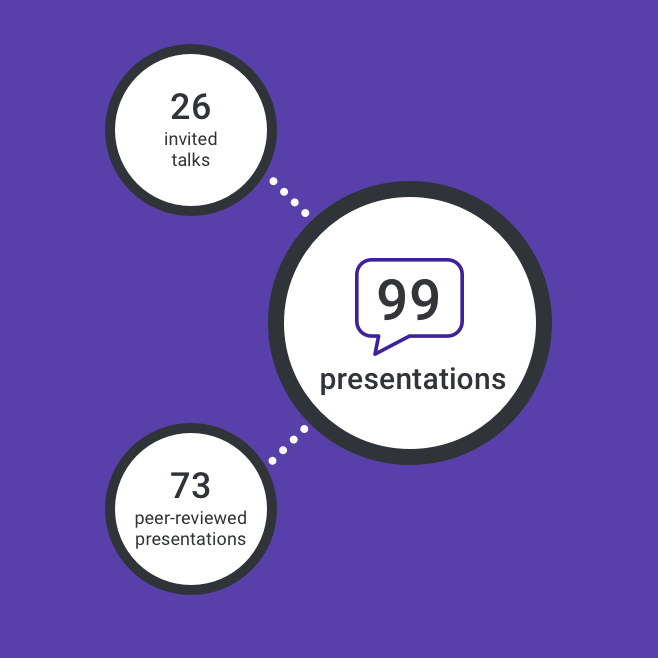 ARiEAL researchers presented 26 invited talks and 73 peer-reviewed conference presentations across continents in 2018.
ARiEAL researchers presented 26 invited talks and 73 peer-reviewed conference presentations across continents in 2018.
Featured below are a selection of these presentations:
Becker, S. (2018, October). Opposing effects of binge drinking and exercise on the brain. Memory Disorders Research Society Annual Meeting. Toronto, Canada. (Invited).
DeMatteo, C., Noseworthy, M., Connolly, J.F., Bock, N., Giglia, L., Lin, C.-Y., . . . Timmons, B. (2018, September). Fact or fiction – What is the true story of return to activity protocols for youth recovery post-concussion: Accelerometry versus self-report. The Third International Conference on Pediatric Acquired Brain Injury. Belfast, Ireland.
Kučerová, I. (2018, May). Toward distributed semantics: Evidence from associative constructions. Stanford University Formal Approaches to Slavic Languages Conference. Stanford, CA. (Invited Keynote Speaker).
View full list of 2018 invited and peer-reviewed presentations
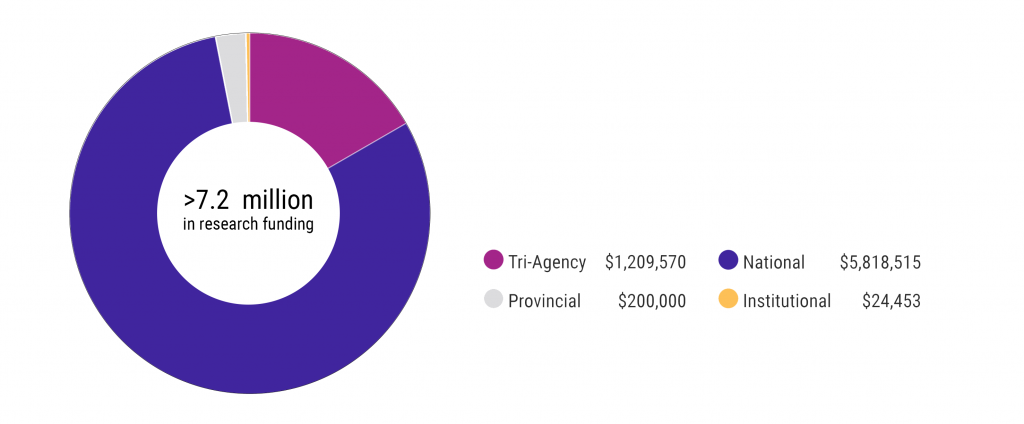
ARiEAL researchers started 15 new research grants as Principal Investigator or Co-investigators in 2018. Funding totaled over 7.2 million dollars across these newly commenced projects.
Funding sources include Canadian Institutes of Health Research (CIHR), Natural Sciences and Engineering Research Council (NSERC), Social Sciences and Humanities Research Council (SSHRC), and the Canadian Foundation for Innovation (CFI), as well as various institutions.
View full list of grants received in 2018
Impact
ARiEAL aims to broaden the research reach beyond what is possible using traditional means in order to engage the global community. In 2018, we have continued to showcase our research excellence through our website, Twitter and open access repository (MacSphere). Various talks and workshops were hosted during 2018 to provide opportunities for interdisciplinary, experiential, and problem-based learning for our trainees and community.
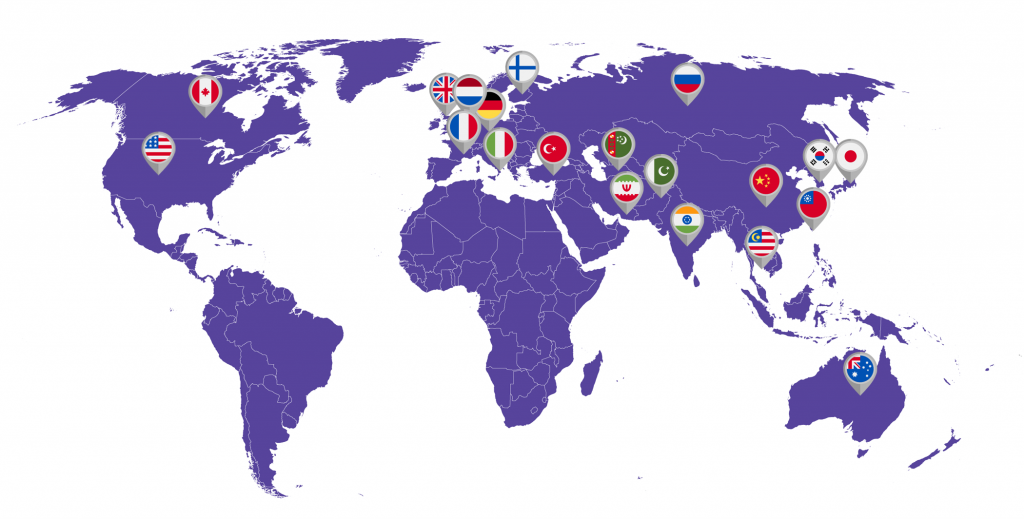 On February 1, 2017, ARiEAL officially launched its website as a platform to share our research knowledge with a broader community beyond borders. During the calendar year of 2018, the ARiEAL website welcomed over 6,500 visitors from 97 distinct countries. This map highlighted the TOP 20 countries where our website visitors come from. Our official Twitter account brings the engagement to an even higher level. In 2018, the number of our followers doubled from the inaugural year. We’ve reached over 100,000 impressions with 165 tweets and exceeded 2,300 engagement counts.
On February 1, 2017, ARiEAL officially launched its website as a platform to share our research knowledge with a broader community beyond borders. During the calendar year of 2018, the ARiEAL website welcomed over 6,500 visitors from 97 distinct countries. This map highlighted the TOP 20 countries where our website visitors come from. Our official Twitter account brings the engagement to an even higher level. In 2018, the number of our followers doubled from the inaugural year. We’ve reached over 100,000 impressions with 165 tweets and exceeded 2,300 engagement counts.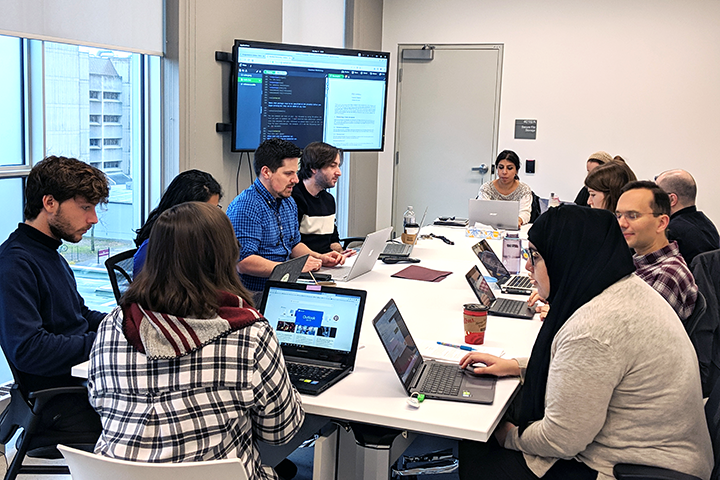
Student-initiated ARiEAL Learning Series session on LaTex. Photo by Chia-Yu Lin.
September 2018 also marked the beginning of the ARiEAL Learning Series which aims to offer various opportunities for trainees (from undergraduate to postdoctoral fellowship) to develop and refine their research skills. The topic of each learning series session reflects the interests that were expressed by the trainees.
View full list of Learning Series Sessions in 2018 Antonella Masciantonio & Diane Potvin, Scholarship Liaison Officers, School of Graduate Studies, McMaster University: Hamilton, Canada. School of Graduate Studies – Scholarships Presentation. September 21, 2018. Chia-Yu Lin, Manager (Development and Research), ARiEAL Research Centre, McMaster University: Hamilton, Canada. Tips and Tricks for Successful Scholarship Application. September 21, 2018. Frederico Prado, Graduate Student, Department of Linguistics & Languages, McMaster University: Hamilton, Canada. LaTeX Workshop. November 9, 2018. Janice Sancan, Research Ethics Officer, Hamilton Integrated Research Ethics Board (HiREB): Hamilton, Canada. HiREB FAQ. November 16, 2018. Michael Wilson, Research Technology Analyst, McMaster Research High Performance Computing Support (RHPCS), McMaster University: Hamilton, Canada. McMaster Research Ethics Manager (MacREM) Information Session. November 23, 2018.
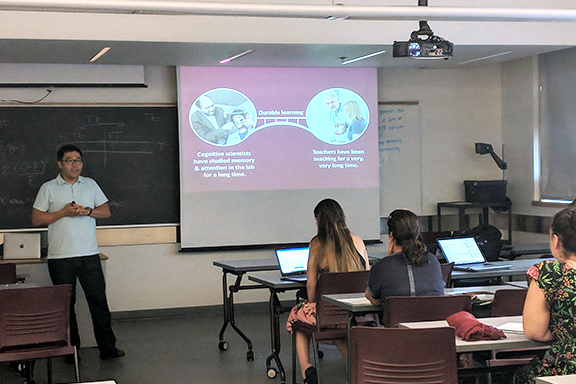
Dr. Joe Kim (Standing) presented “Motivating durable learning: Focused attention through instructional design” at the September 2019 Lecture Series.
In 2018, ARiEAL co-hosted eight “Cognitive Science of Language Lecture Series” talks with the Department of Linguistics and Languages (McMaster University). For these events, we invited renowned researchers in their respective fields to share their expertise with us.
View full list of Lecture Series Talks and Conferences hosted in 2018
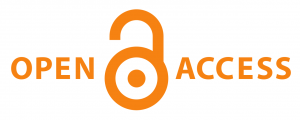 ARiEAL endeavours to support Open Access in research. In addition to publishing in Open Access journals, ARiEAL started archiving representative publications from our researchers at MacSphere (McMaster University’s Institutional Repository). This Open Access initiative commenced in 2017 and is continually progressing. In addition, with support from McMaster University and eCampusOntario’s Open Textbook initiative, ARiEAL Researcher Dr. Catherine Anderson published an open-access Linguistics textbook entitled Essentials of Linguistics to address the affordability and accessibility of course materials.
ARiEAL endeavours to support Open Access in research. In addition to publishing in Open Access journals, ARiEAL started archiving representative publications from our researchers at MacSphere (McMaster University’s Institutional Repository). This Open Access initiative commenced in 2017 and is continually progressing. In addition, with support from McMaster University and eCampusOntario’s Open Textbook initiative, ARiEAL Researcher Dr. Catherine Anderson published an open-access Linguistics textbook entitled Essentials of Linguistics to address the affordability and accessibility of course materials.
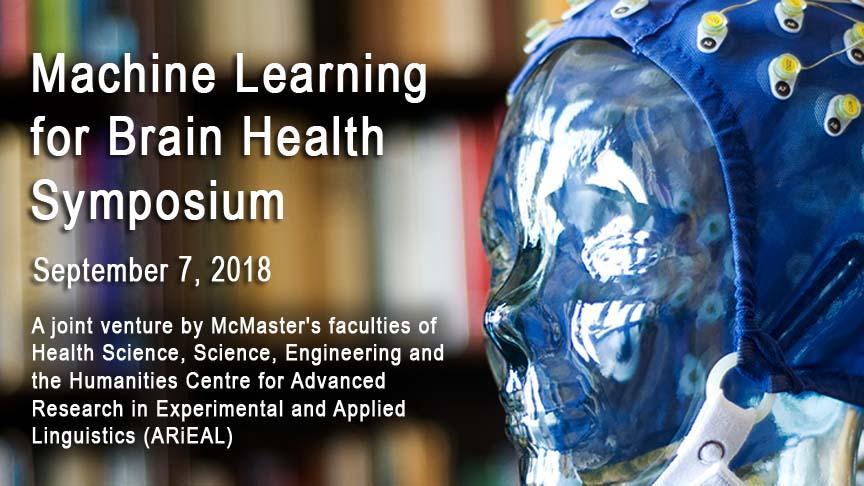
Machine Learning for Brain Health Symposium. Photo by Richard Mah.
The inaugural Machine Learning for Brain Health Symposium was made possible as a joint venture by McMaster’s faculties of Health Sciences, Science, Engineering and ARiEAL Research Centre. Five distinguished researchers in the field of computational biology and biomedical engineering were invited as keynote speakers, including Dr. Sylvain Baillet, the ARiEAL Scientific Advisory Committee member.
View full list of Invited Keynote Speakers at Machine Learning for Brain Health Symposium Dr. Sylvain Baillet, Professor, School of Computer Science, McGill University: Montreal, Canada. Perception as prediction: Using neural network architectures to study brain perceptual inference. September 7, 2018. Dr. Martin M. Monti, Associate Professor, Department of Psychology, UCLA: Los Angeles, USA. Disappearing into nothingness: Graphs, shapes, and advanced analysis techniques applied to understanding disorders of consciousness. September 7, 2018. Dr. Klaus-Robert Müller, Professor and Chair, Machine Learning Department, Institute of Software Engineering and Theoretical Computer Science: Berlin, Germany. Toward brain computer interfacing: Algorithms for on-line differentiation of neuroelectric activities. September 7, 2018. Dr. Jose C. Principe, Distinguished Professor, NeuroEngineering Lab, University of Florida: Gainesville, Florida. The importance of point process models to quantify the electroencephalogram. September 7, 2018. Dr. Stephen Strother, Professor, Department of Medical Biophysics, University of Toronto: Toronto, Canada. Big data variety and veracity in brain-Code: 80% quality curation and 20% analysis. September 7, 2018.
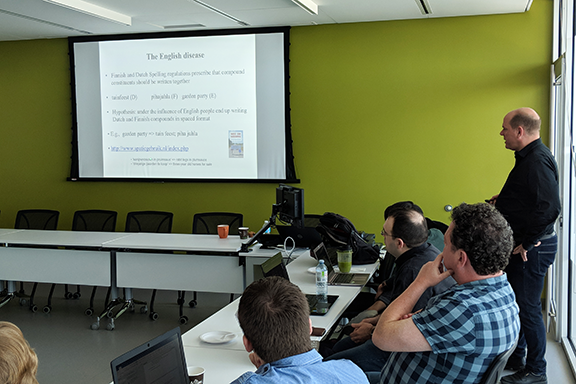
Dr. Raymond Bertram (Standing) from University of Turku led a workshop on “How to gain insight into reading processes”. Photo by Chia-Yu Lin.
Dr. Aline Godfroid, Associate Professor, Department of Second Language Studies, Michigan State University: East Lansing, USA. Experimental tasks and paradigms in second-language vocabulary learning. January 25, 2018.
Dr. Raymond Bertram, Senior Lecturer, Department of Psychology and Speech-Language Pathology, University of Turku: Turku, Finland. How to gain insight into reading processes. May 9, 2018.
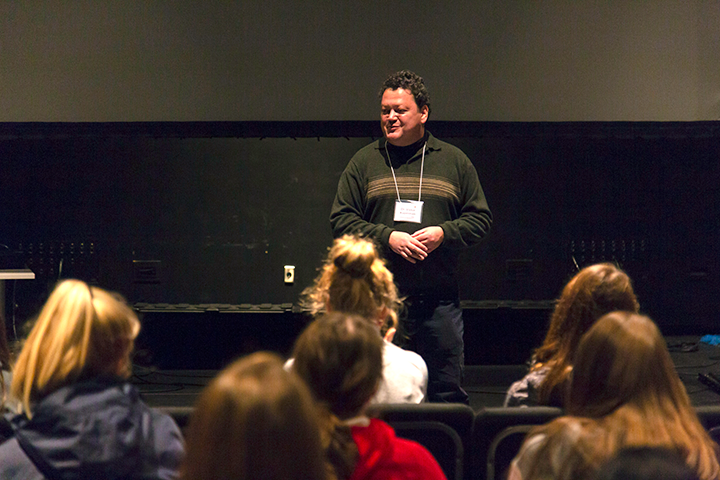
Dr. Victor Kuperman (Standing) welcomed students from Hamilton Christian High School. Photo by Colin Czerneda.
ARiEAL aims to engage youth into the culture of research and higher education through meaningful activities. We hope more young people would be inspired by the exciting research we carry out at ARiEAL and it would also motivate them to be part of the McMaster community one day. In 2018, led by Dr. Victor Kuperman, ARiEAL and the Department of Linguistics and Languages co-hosted a research day featured “Science Behind Language Acquisition” for a group of grades 11 and 12 students from Hamilton Christian High School. Dr. John Connolly from the Language, Memory and Brain Lab also participated as a placement mentor in the Hamilton Health Sciences High School Research Bursary program, a highly competitive summer internship program designed for senior high school students interested in pursuing health and life science postsecondary education. Caryn Qian, a then grade 11 student from Marc Garneau Collegiate Institute, completed the 7-week internship at ARiEAL in 2018. She has since been accepted by the McMaster Health Sciences program to pursue her undergraduate education.
The Centre
Founded in late 2016, the year of 2018 marks the second full calendar year since our inception. We are proud of the high-quality opportunities for collaborative and interdisciplinary research among our members and trainees that ARiEAL has continued to foster.
FOUNDING DIRECTOR
John Connolly (Department of Linguistics and Languages, McMaster University)
ASSOCIATE DIRECTOR
Anna Moro (Department of Linguistics and Languages, McMaster University)
FULL MEMBERS
Catherine Anderson (Department of Linguistics and Languages, McMaster University)
Sue Becker (Department of Psychology, Neuroscience & Behaviour, McMaster University)
Marc Joanisse (Department of Psychology, University of Western Ontario)
Ivona Kučerová (Department of Linguistics and Languages, McMaster University)
Victor Kuperman (Department of Linguistics and Languages, McMaster University)
Michael Noseworthy (Department of Electrical and Computer Engineering, McMaster University)
Daniel Pape (Department of Linguistics and Languages, McMaster University)
Jim Reilly (Department of Electrical and Computer Engineering, McMaster University)
Elisabet Service (Department of Linguistics and Languages, McMaster University)
Lyn Turkstra (School of Rehabilitation Science, McMaster University)
ASSOCIATE MEMBERS
Lisa Archibald (Department of Psychology, University of Western Ontario)
Carol DeMatteo (School of Rehabilitation Science, McMaster University)
Paul Grunthal (McMaster Industry Liaison Office, McMaster University)
Ranil Sonnadara (Department of Surgery, McMaster University)
POSTDOCTORAL FELLOWS
Dr. Stephanie Bouvier* (Supervised by Dr. Ranil Sonnadara)
Dr. Sinisa Colic (Co-supervised by Drs. Jim Reilly & Gary Hasey)
Dr. Félix Desmeules-Trudel (Supervised by Dr. Marc Joanisse)
Dr. Kiret Dhindsa (Supervised by Dr. Ranil Sonnadara)
Dr. Dobri Dotov (Supervised by Dr. Ranil Sonnadara)
Dr. Aki Kyröläinen (Supervised by Dr. Victor Kuperman)
Dr. Pan Liu (Co-supervised by Drs. Marc Joanisse & Elizabeth Hayden)
Dr. Lien Peters (Co-supervised by Drs. Marc Joanisse & Daniel Ansari)
Dr. Daniel Schmidtke (Supervised by Dr. Anna Moro)
Dr. Hossein Taghinesuad* (Supervised by Dr. Ranil Sonnadara)
Dr. Christina Vanden Bosch der Nederlanden (Co-supervised by Drs. Marc Joanisse & Jessica Grahn)
Dr. Nicholas Welch* (Supervised by Dr. Ivona Kučerová)
PHD STUDENTS
Anita Acai (Supervised by Dr. Ranil Sonnadara)
Areej Balilah* (Supervised by Dr. Lisa Archibald)
Taylor Bardell (Supervised by Dr. Lisa Archibald)
Rober Boshra (Co-supervised by Drs. John Connolly & Jim Reilly)
Fiona Campbell (Supervised by Dr. Lyn Turkstra)
Phil Chrapka* (Supervised by Dr. Jim Reilly)
Cassandra Chapman* (Supervised by Dr. Ivona Kučerová)
Melda Coskun (Supervised by Dr. Victor Kuperman)
Alexandra Cross (Co-supervised by Drs. Marc Joanisse & Lisa Archibald)
Ethan Danielli (Supervised by Dr. Michael Noseworthy)
Rudaina Hamed (Co-supervised by Drs. Anna Moro & Victor Kuperman)
Adianes Herrera (Supervised by Dr. John Connolly)
Craig Hutton* (Supervised by Dr. Sue Becker)
Constance Imbault (Supervised by Dr. Victor Kuperman)
Aravinthan Jegatheesan (Supervised by Dr. Michael Noseworthy)
Portia Kalun (Supervised by Dr. Ranil Sonnadara)
Laura Keating* (Co-supervised by Drs. Sue Becker & Margaret McKinnon)
Alyssa Kuiack (Supervised by Dr. Lisa Archibald)
Bre-Anna King (Supervised by Dr. Elisabet Service)
Richard Mah* (Supervised by Dr. John Connolly)
Evan McNabb* (Supervised by Dr. Michael Noseworthy)
Sydney McQueen (Co-supervised by Drs. Ranil Sonnadara & Carol-Anne Moulton)
Joe Nidel (Supervised by Dr. Marc Joanisse)
Kelly Nisbet (Supervised by Dr. Victor Kuperman)
Nicolette Noonan* (Co-supervised by Drs. Marc Joanisse & Lisa Archibald)
Gaisha Oralova (Co-supervised by Drs. John Connolly & Victor Kuperman)
Laura Pauls* (Supervised by Dr. Lisa Archibald)
Sara Pearsell (Supervised by Dr. Daniel Pape)
Theresa Pham (Supervised by Dr. Lisa Archibald)
Paul Polak (Supervised by Dr. Michael Noseworthy)
Adam Politis (Supervised by Dr. Lyn Turkstra)
Fareeha Rana (Co-supervised with Drs. Elisabet Service & John Connolly)
Kyle Ruiter (Supervised by Dr. John Connolly)
Alejandro Santos-Diaz* (Supervised by Dr. Michael Noseworthy)
Saurabh Shaw (Supervised by Dr. Sue Becker)
Edalat Shekari (Supervised by Dr. Elisabet Service)
Lauren Smail (Co-supervised by Drs. Ranil Sonnadara & Sue Becker)
Bryor Snefjella (Supervised by Dr. Victor Kuperman)
Narcisse Torshizi (Supervised by Dr. Elisabet Service)
Karen Tucker (Supervised by Dr. John Connolly)
Meghan Vollebregt (Supervised by Dr. Lisa Archibald)
Natalie Wagner (Supervised by Dr. Ranil Sonnadara)
Chelsea Whitwell (Supervised by Dr. Elisabet Service)
Nadia Wong (Co-supervised by Drs. Sue Becker & Hongjin Sun)
Bahareh Yousefzadeh (Supervised by Dr. Ivona Kučerová)
MASTER STUDENTS
Reihaneh Ahmadi (Supervised by Dr. Lyn Turkstra)
Fatemeh Armanfard (Co-supervised by Drs. Jim Reilly & John Connolly)
Leah Brainin (Supervised by Dr. Marc Joanisse)
Erin Cole* (Supervised by Prof. Carol DeMatteo)
Nathan Cupido (Supervised by Dr. Ranil Sonnadara)
Erin DeBorba (Supervised by Dr. Elisabet Service)
Nathalee Ewers (Supervised by Dr. John Connolly)
Michael Fischer (Supervised by Prof. Carol DeMatteo)
Davide Gentile (Supervised by Dr. Victor Kuperman)
Ashley Gilbank (Supervised by Dr. Michael Noseworthy)
Diana Harasym* (Co-supervised by Drs. Michael Noseworthy & Aimee Nelson)
Tess Hudson (Supervised by Dr. Ivona Kučerová)
Sara Jamil* (Co-supervised by Drs. Ranil Sonnadara & Sue Becker)
Isaac Kinley (Supervised by Dr. Sue Becker)
Alish Kocz (Supervised by Dr. Ivona Kučerová)
Dr. Richard Kolesar (Supervised by Dr. John Connolly)
Natalia Lapinskaya* (Supervised by Dr. John Connolly)
Teagan Lauriente (Supervised by Dr. Ranil Sonnadara)
Yarden Levy (Co-supervised by Drs. Sue Becker & Margaret McKinnon)
Mitchell Locke (Co-supervised by Drs. Michael Noseworthy & Aimee Nelson)
Renata Lohemann* (Supervised by Dr. Lisa Archibald)
Angie Lopez (Supervised by Dr. Elisabet Service)
Neil MacPhee (Supervised by Dr. Michael Noseworthy)
Sean McCarron (Supervised by Dr. Victor Kuperman)
Olivier Mercier (Co-supervised by Drs. Elisabet Service & Daniel Pape)
Christine Moreau (Supervised by Dr. Marc Joanisse)
Omar Nassif (Co-supervised by Drs. Jim Reilly & Vickie Galea)
Jimmy Nguyen (Supervised by Dr. Michael Noseworthy)
Cameron Nowikow (Supervised by Dr. Michael Noseworthy)
Dr. Christine Orr* (Supervised by Dr. Ranil Sonnadara)
Taylor Practile (Supervised by Prof. Carol DeMatteo)
Frederico Prado (Supervised by Dr. Ivona Kučerová)
Alex Rokos* (Co-Supervised by Drs. John Connolly & Stefanie Blain-Moraes)
Natalie Romaniuk (Supervised by Prof. Carol DeMatteo)
Nicholas Simard* (Co-supervised by Drs. Michael D. Noseworthy & Aimee Nelson)
Dr. Laura VanderBeek* (Supervised by Dr. Ranil Sonnadara)
*Completed program in 2018
MANAGER, DEVELOPMENT & RESEARCH
Chia-Yu Lin
STUDENT ASSISTANTS
Angie Lopez (January – April, 2018)
Kiera DiLeonardo (May – August, 2018)
Brittany Gottvald (September – December, 2018)
Dr. Sylvain Baillet (McGill University)
Dr. Laurie Feldman (University at Albany)
Dr. Denise Klein (McGill University)
Dr. Ken McRae (University of Western Ontario)
Dr. Lucie Ménard (Université du Québec à Montréal; UQAM)
Dr. Penny Pexman (University of Calgary)
Dr. Ken Pugh (Haskins Laboratories)
Dr. Sid Segalowitz (Brock University)
Dr. Jon Sprouse (University of Connecticut)
Haskins Laboratories, New Haven, Connecticut, USA
University of Turku (Department of Psychology and Speech-Language Pathology), Turku, Finland.
Words in the World (WoW), Partnership Grant funded by the Social Sciences and Humanities Research Council of Canada (SSHRC), Canada
Produced & Designed by Brie Chauncey, Chia-Yu Lin, and Brittany Gottvald. Many thanks to all ARiEAL members and trainees for their contribution to this report.
ARiEAL Research Centre
L.R. Wilson Hall, Room 4020
McMaster University
1280 Main St. West
Hamilton, Ontario L8S 4K1, Canada
Phone: 905-525-9140 x21032
Email: ariealrc@mcmaster.ca

ARiEAL Research Centre
L.R. Wilson Hall, Room 4020
McMaster University
1280 Main St. West
Hamilton, Ontario L8S 4K1, Canada
Phone: 905-525-9140 x21032
Email: ariealrc@mcmaster.ca
Twitter: @arieal_research

